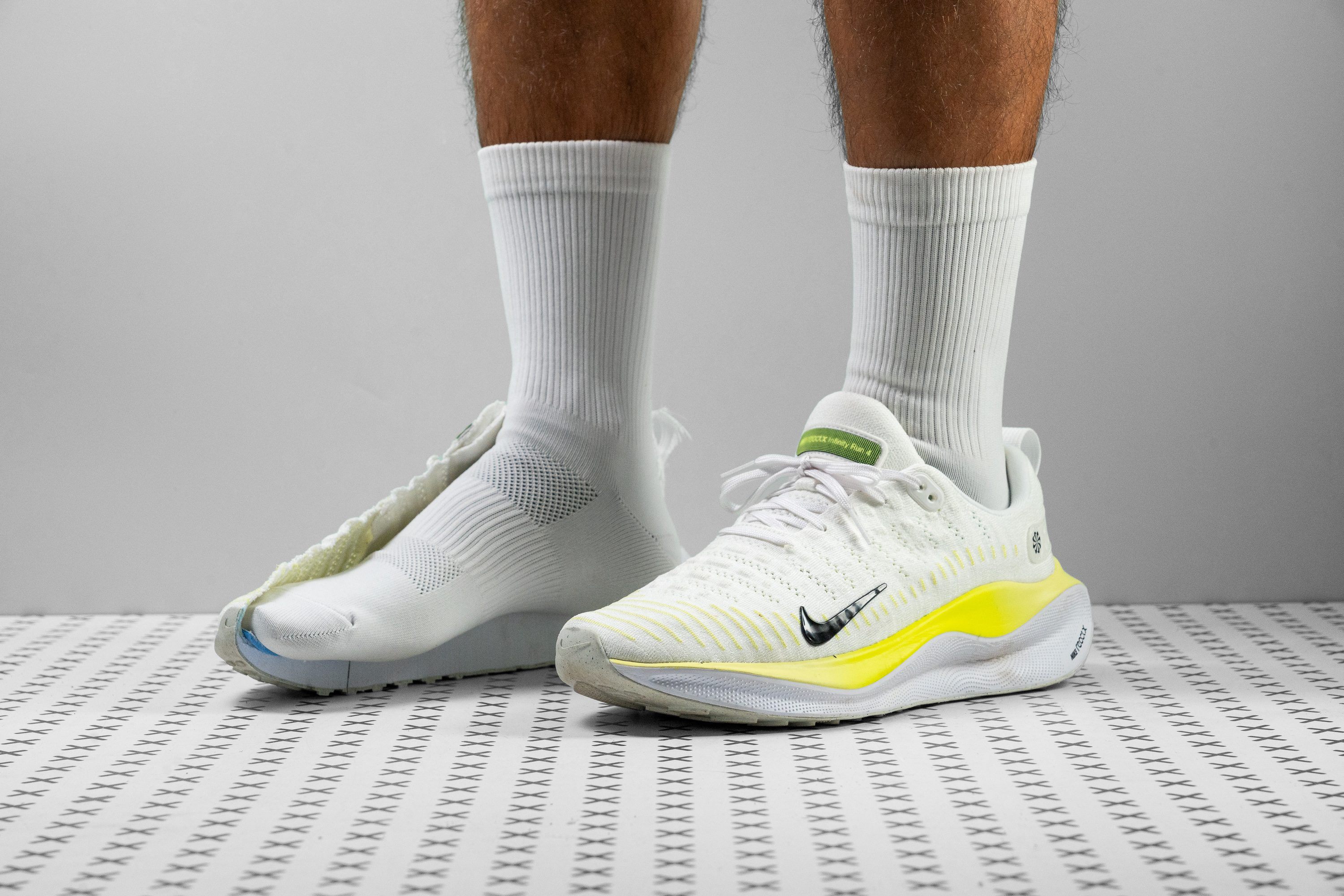Our verdict
- Our top pick in best Nike running shoes
- Our top pick in best Nike walking shoes
Pros
- All-new ReactX plush midsole
- Soft and stretchy Flyknit upper
- Ideal for heel strikers
- Generously cushioned
- Excellent for easy runs
- Feels like running on clouds
- Durable, long-lasting outsole
- Reduced carbon footprint
Cons
- Average-at-best breathability
- On the heavier side
- Sizes run notably small
Audience verdict
- Top 18% most popular running shoes
Comparison
The most similar running shoes compared
+ + Add a shoe | |||||
|---|---|---|---|---|---|
| Audience score | 86 Good! | 88 Great! | 87 Good! | 87 Good! | |
| Price | $160 | $140 | $160 | $75 | |
| Pace | Daily running | Daily running | Daily running | Daily running | |
| Arch support | Neutral | Neutral | Neutral | Neutral | |
| Weight lab Weight brand | 11.1 oz / 316g 11.1 oz / 316g | 9.9 oz / 281g 10 oz / 283g | 9.9 oz / 282g 10.1 oz / 286g | 11.2 oz / 318g 10.1 oz / 285g | |
| Drop lab Drop brand | 9.8 mm 9.0 mm | 11.4 mm 10.0 mm | 7.7 mm 10.0 mm | 12.9 mm 8.0 mm | |
| Strike pattern | HeelMid/forefoot | Heel | Mid/forefoot | Heel | |
| Midsole softness | Soft | Soft | Soft | Balanced | |
| Difference in midsole softness in cold | Big | Normal | Small | Normal | |
| Toebox durability | Good | Decent | Decent | Bad | |
| Heel padding durability | Decent | Good | Good | Bad | |
| Outsole durability | Good | Good | Good | Decent | |
| Breathability | Moderate | Moderate | Moderate | Moderate | |
| Toebox width at the widest part | Medium | Medium | Medium | Medium | |
| Toebox width at the big toe | Medium | Medium | Medium | Medium | |
| Stiffness | Flexible | Flexible | Flexible | Flexible | |
| Difference in stiffness in cold | Big | Big | Small | Big | |
| Torsional rigidity | Moderate | Flexible | Moderate | Moderate | |
| Heel counter stiffness | Flexible | Stiff | Moderate | Flexible | |
| Heel lab Heel brand | 34.2 mm 39.0 mm | 33.6 mm 37.0 mm | 33.9 mm 39.0 mm | 31.9 mm 34.0 mm | |
| Forefoot lab Forefoot brand | 24.4 mm 30.0 mm | 22.2 mm 27.0 mm | 26.2 mm 29.0 mm | 19.0 mm 26.0 mm | |
| Widths available | NormalWideX-Wide | NormalWideX-Wide | NormalWideX-Wide | NormalWide | |
| Orthotic friendly | ✓ | ✓ | ✓ | ✓ | |
| Season | All seasons | All seasons | All seasons | All seasons | |
| Removable insole | ✓ | ✓ | ✓ | ✓ | |
| Ranking | #166 Bottom 36% | #102 Top 40% | #132 Bottom 49% | #130 Top 50% | |
| Popularity | #46 Top 18% | #9 Top 4% | #13 Top 5% | #179 Bottom 31% |
Who should buy
The Nike InfinityRN 4 gets our seal of approval for:
- Runners who are all about cushioning and aren't concerned with the shoe's weight.
- Marathoners looking for a comfortable pair for easy or moderate runs.
- Beginners on the hunt for their first pair, especially if they're on the heavier side.
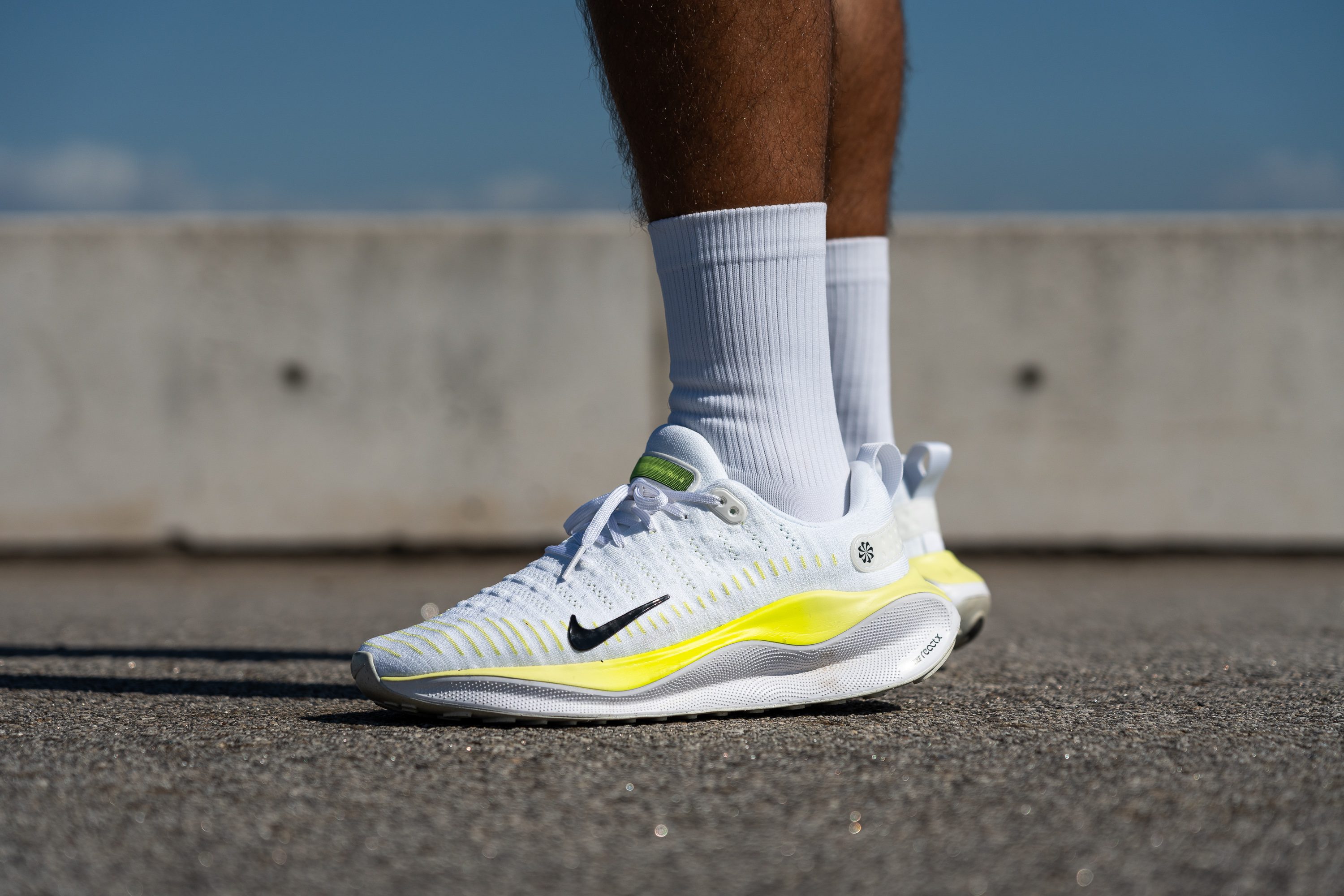
Who should NOT buy
While the ReactX foam represents a clear improvement over React, it doesn't quite match the world-class energy return of ZoomX. If performance and bounce are what you're after, we think that the Nike Invincible 3 offers a similar concept and design, but with a full ZoomX midsole.
Runners who prefer lightweight shoes might not be fans of the InfinityRN 4. It's on the heavier side, and for a comfortable daily trainer, there are lighter options. We recommend considering the ASICS Cumulus 25 or the New Balance Fresh Foam X 1080 v12, both of which deliver similar features in a lighter package.
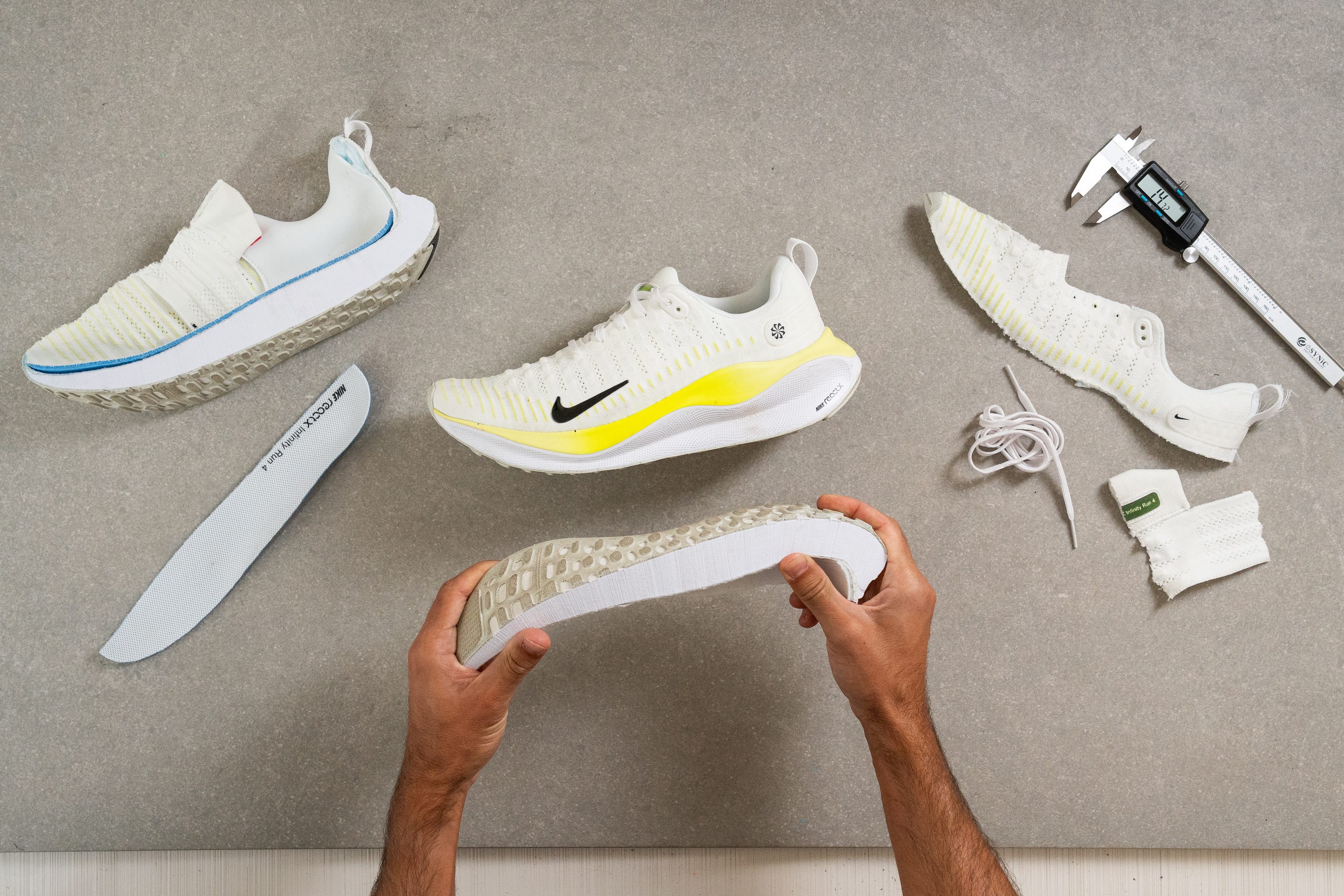
Breathability
Knit uppers often provide great comfort, but they can come with challenges, particularly when it comes to breathability. We discovered that the Nike InfinityRN 4 falls into this category.
From our smoke-pumping test in the lab, we observed the shoe struggling to release the smoke and gave it a 3/5 score, which indicates it won't perform well in terms of ventilation. We'd advise against using them for hot summer runs.
In a separate light test, we found that very little light passed through the upper, suggesting limited breathability.
It's clear that Nike prioritized comfort with this model. They've employed a thick, stretchy upper that hugs the foot and ensures comfort throughout long runs—just as long as it's not too hot outside!
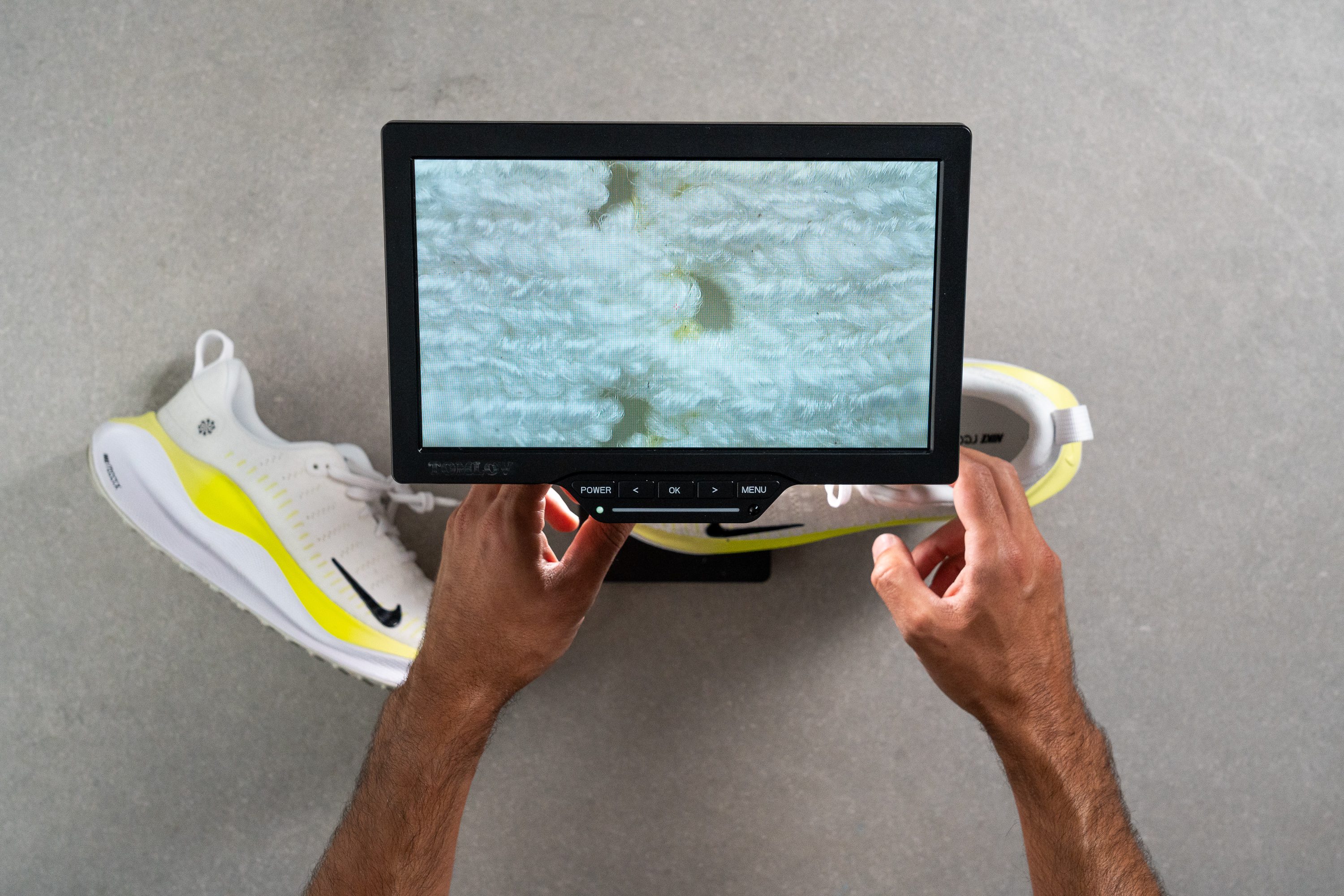
Upon closer inspection under our microscope, we noticed a few breathability holes that offer some airflow. Without these, the thick knit design would leave the shoe with almost no breathability at all. Thankfully, there's at least a bit of ventilation.
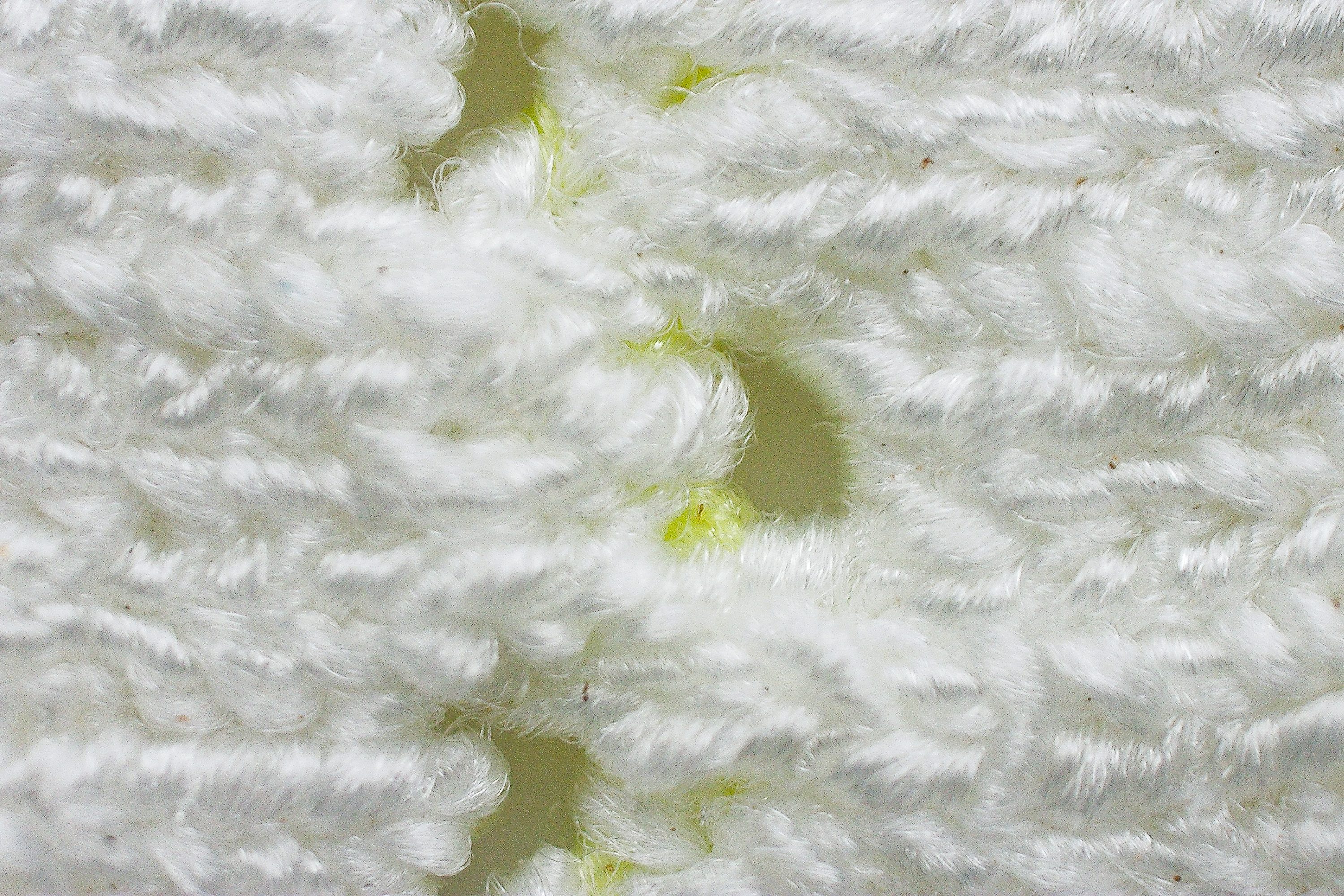
| InfinityRN 4 | 3 |
| Average | 3.8 |
Durability
Toebox durability
While employing a robust Flyknit upper it's a bad idea regarding airflow, its exceptional durability is commendable.
We've found that the InfinityRN 4, with its impressive 4/5 rating, truly shines in our Dremel test when compared to almost any other road running shoe.
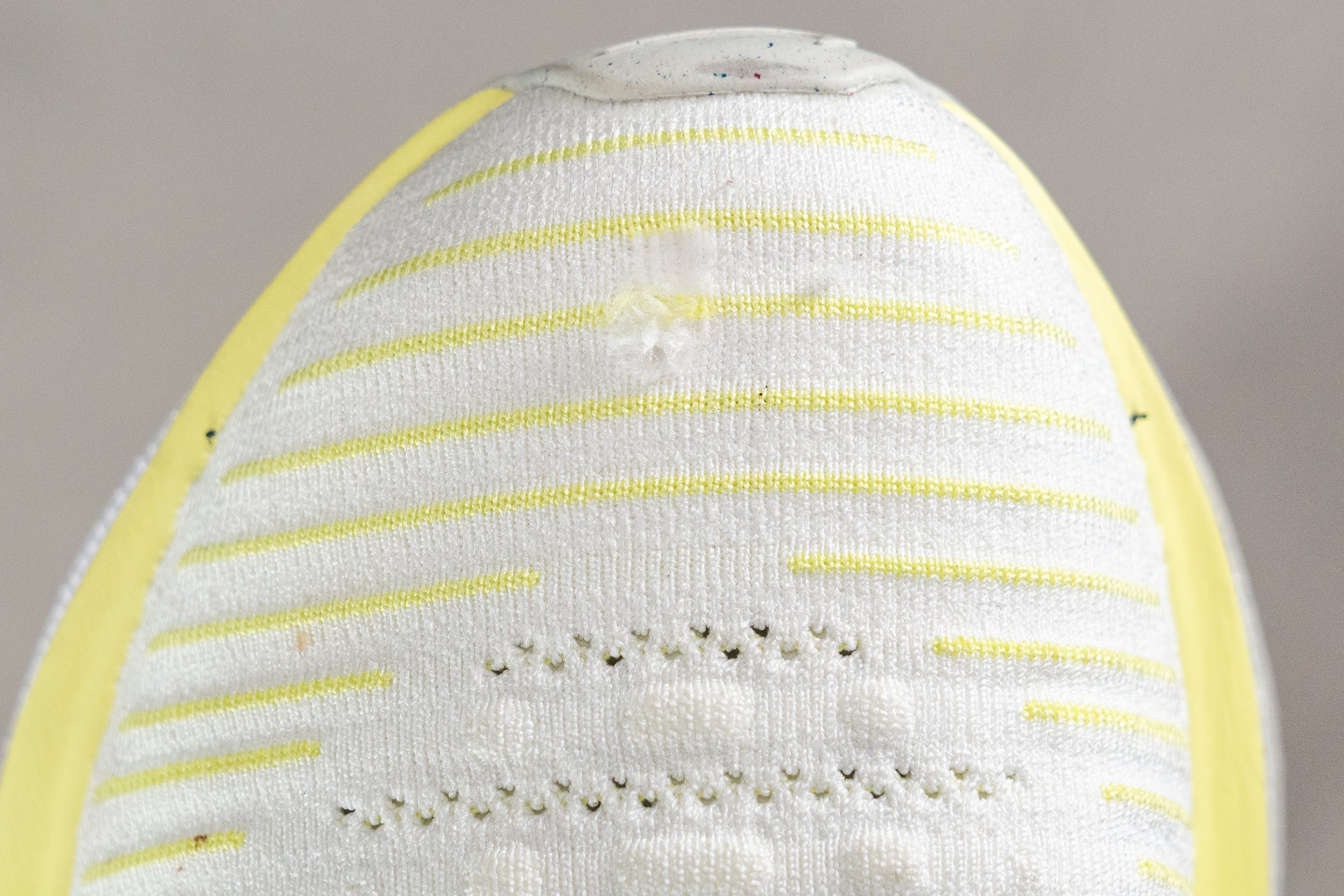
| InfinityRN 4 | 4 |
| Average | 2.5 |
Heel padding durability
The heel also displays commendable durability, earning a solid 3/5 after facing the Dremel challenge.
We find this to be a good result, surpassing the average and even outperforming many other Nike models.
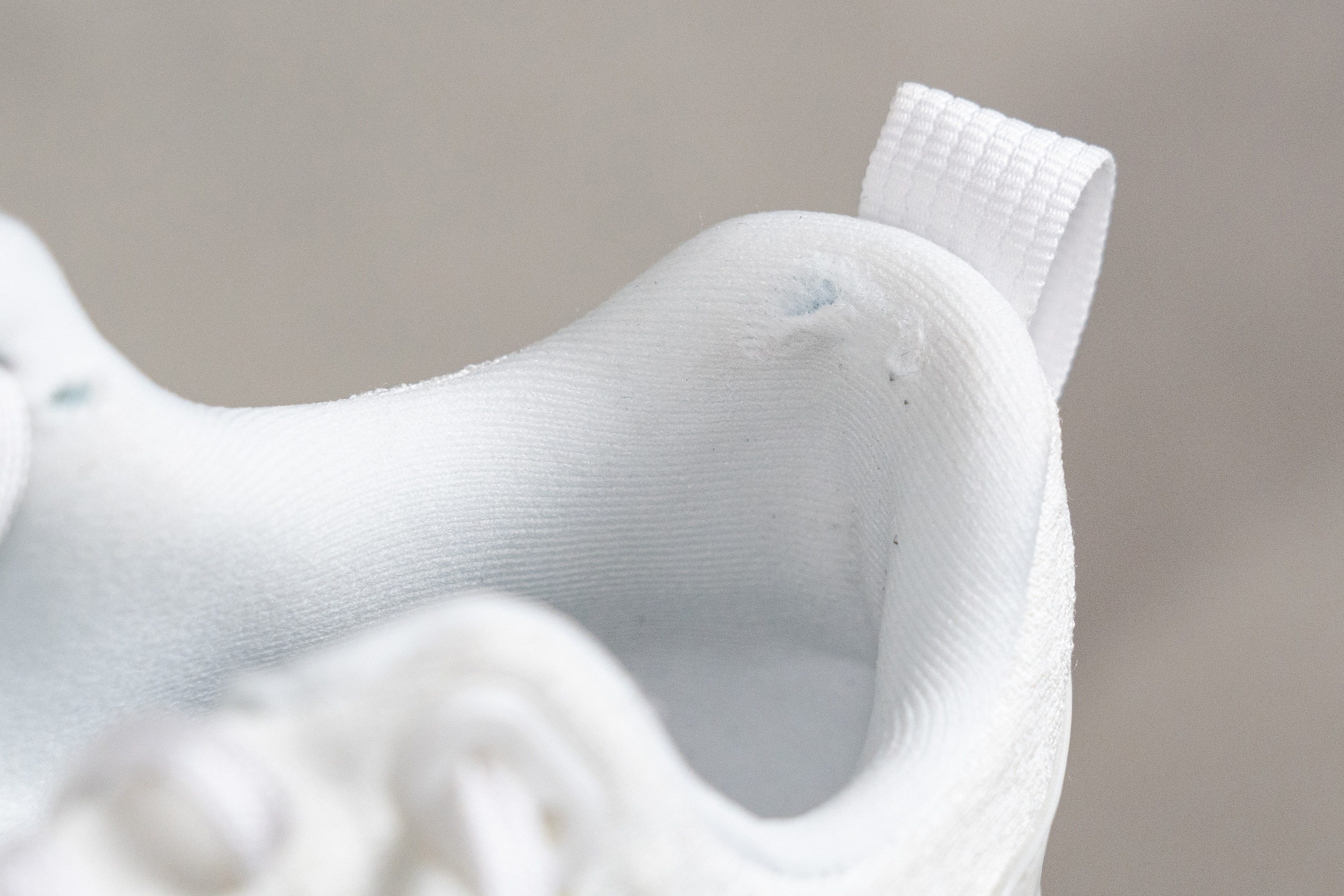
| InfinityRN 4 | 3 |
| Average | 3.3 |
Outsole hardness
Nike's priority for this outsole was clear: long-lasting wear, even if it means less grip.
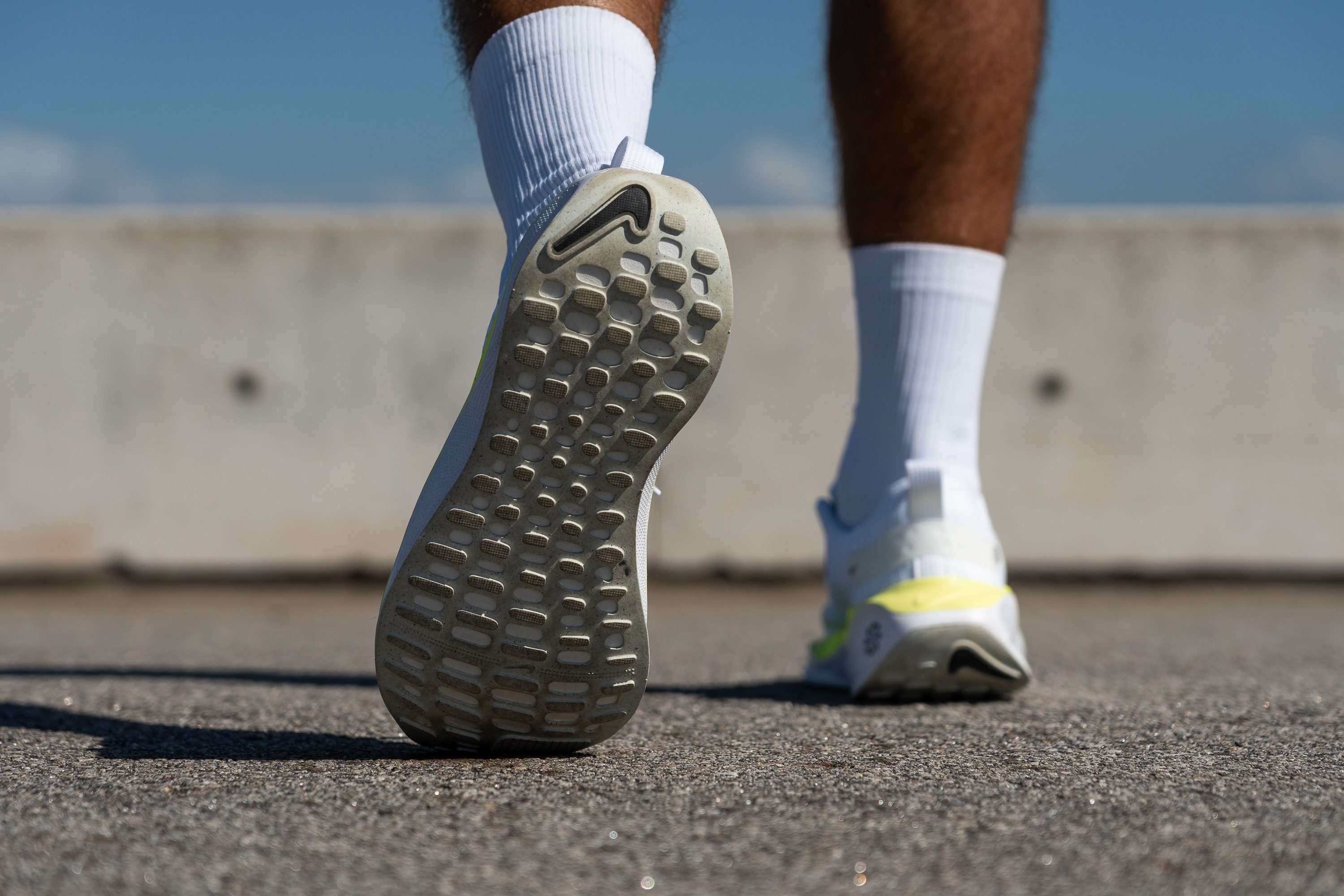
With the InfinityRN 4, they've incorporated a 90.4 HC outsole—one of the hardest we've ever measured in our lab.
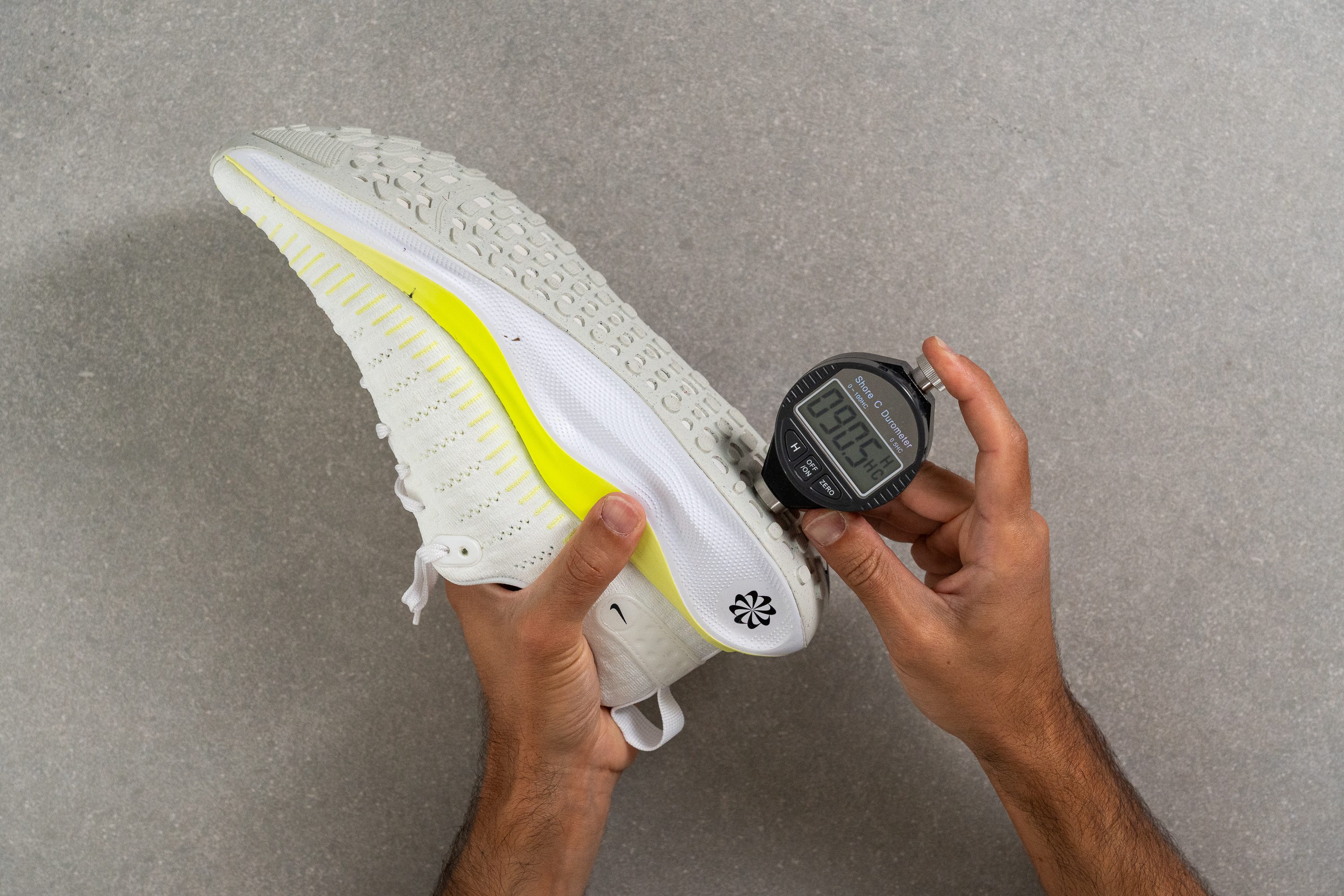
| InfinityRN 4 | 90.4 HC |
| Average | 80.1 HC |
Outsole durability
The tough rubber Nike uses really shows its strength. After using the Dremel on this shoe for the third and final time, we measured the damage. The indentation was a mere 0.3 mm!
That's an impressive result. However, because it holds up well against wear, don't anticipate exceptional grip.
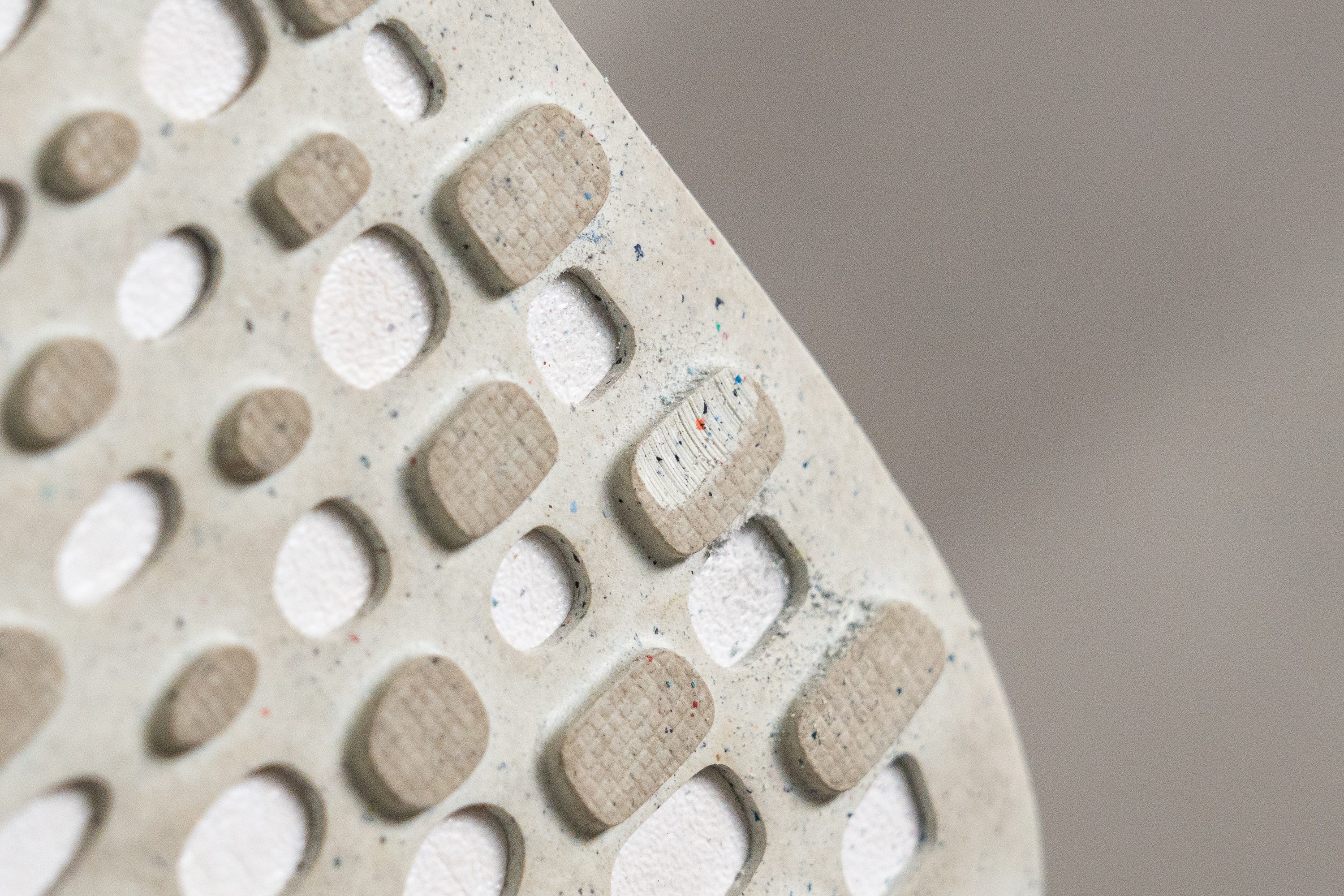
| InfinityRN 4 | 0.3 mm |
| Average | 0.9 mm |
Outsole thickness
We're certain that, just like us in our lab, Nike assessed the abrasion resistance of the outsole.
Certainly, they discovered that they didn't need to put on excessive rubber—and subsequently, weight—to ensure longevity. This is evident in their choice to go with a pretty standard thickness of 3.7 mm.
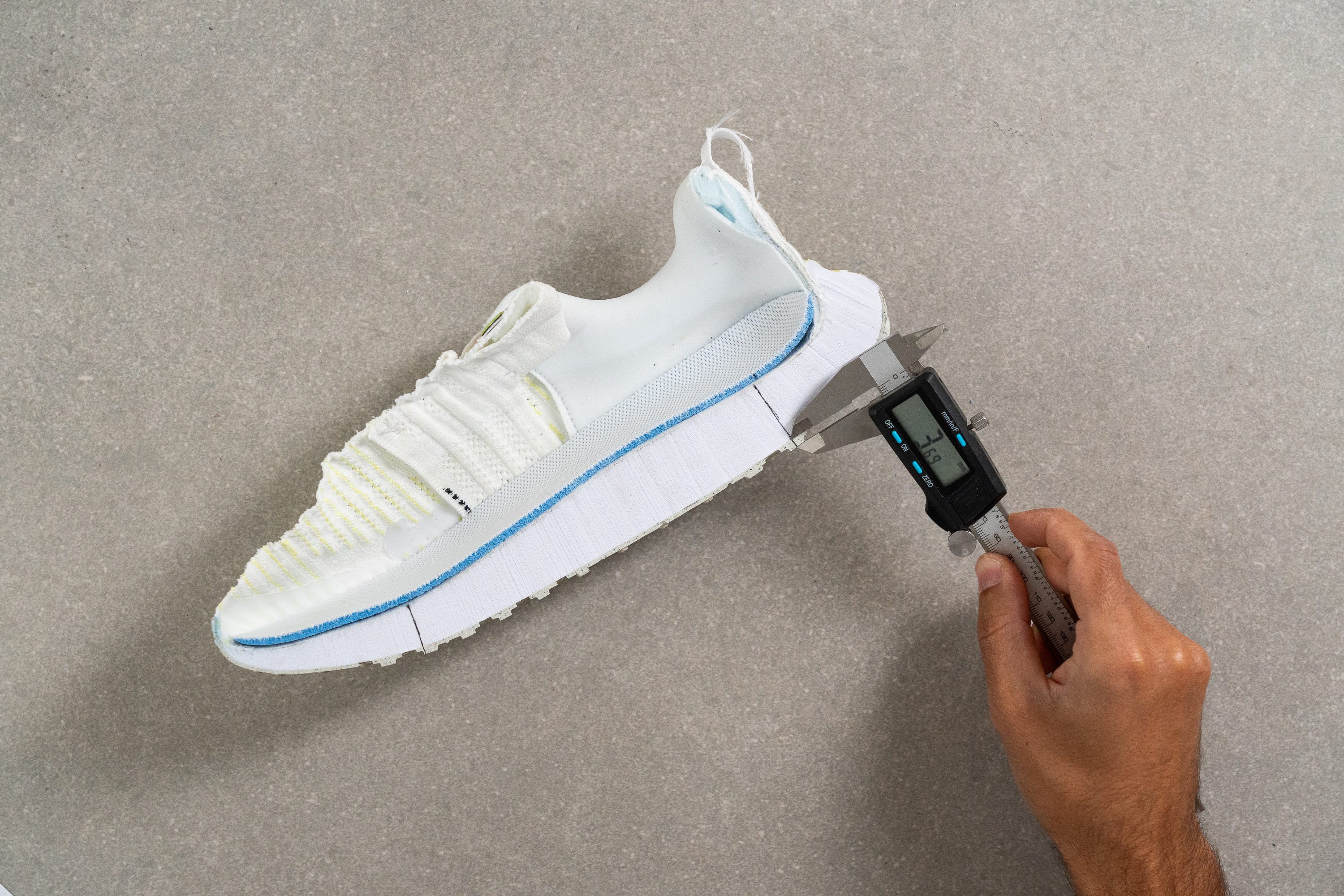
| InfinityRN 4 | 3.7 mm |
| Average | 3.2 mm |
Weight
While they attempted to lighten the load with outsole cutouts, the shoe still tips the scales. Weighing in at 11.1 oz (316g), it's undeniably on the heavier side.
To put things in perspective, the ASICS Superblast manages to be 2.7 oz lighter even with a higher stack height.
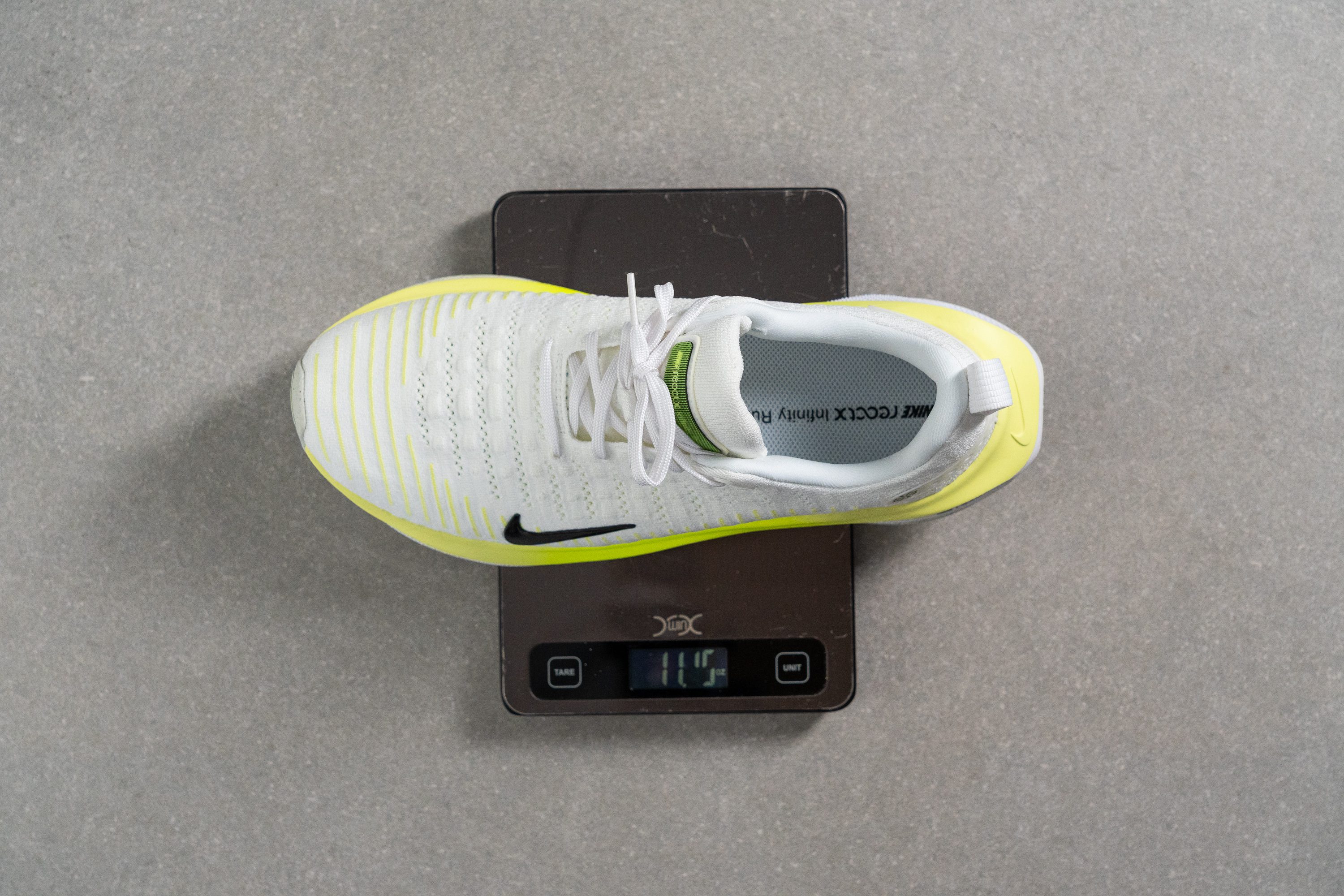
| InfinityRN 4 | 11.15 oz (316g) |
| Average | 9.35 oz (265g) |
Cushioning
Heel stack
Given its weight, we expected the shoe to have a notably thick stack height. However, we discovered that it's actually quite average.
A couple of years ago, 34.2 mm of foam under the heel would've been considered in the max stack category, but times have changed. As Dylan sang, "The times they are a-changin'."
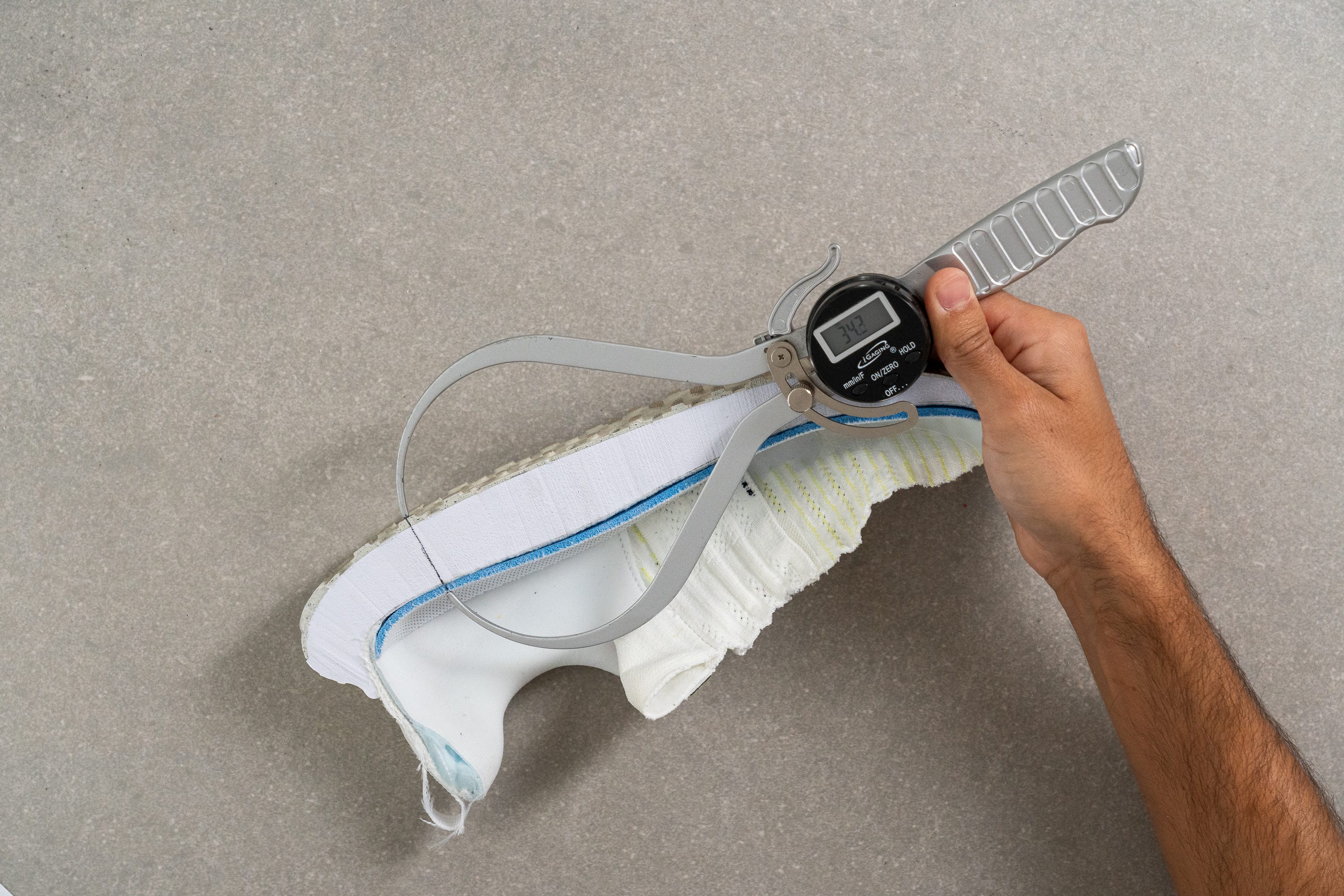
| InfinityRN 4 | 34.2 mm |
| Average | 33.9 mm |
Forefoot stack
In the forefoot, we measured a typical thickness of 24.4 mm.
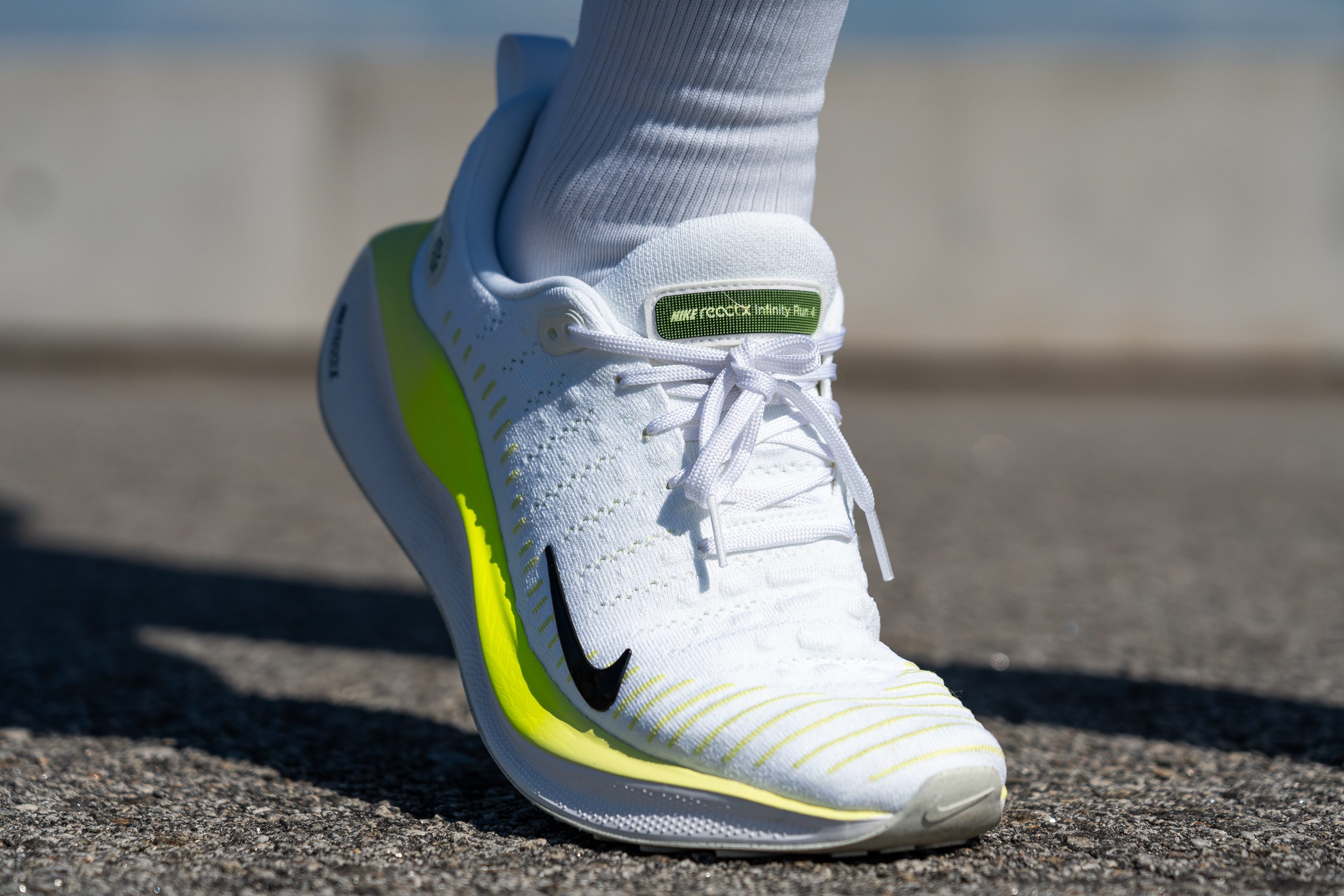
We found that this provides enough cushioning for any runner. It makes this shoe a reliable choice even for long runs.
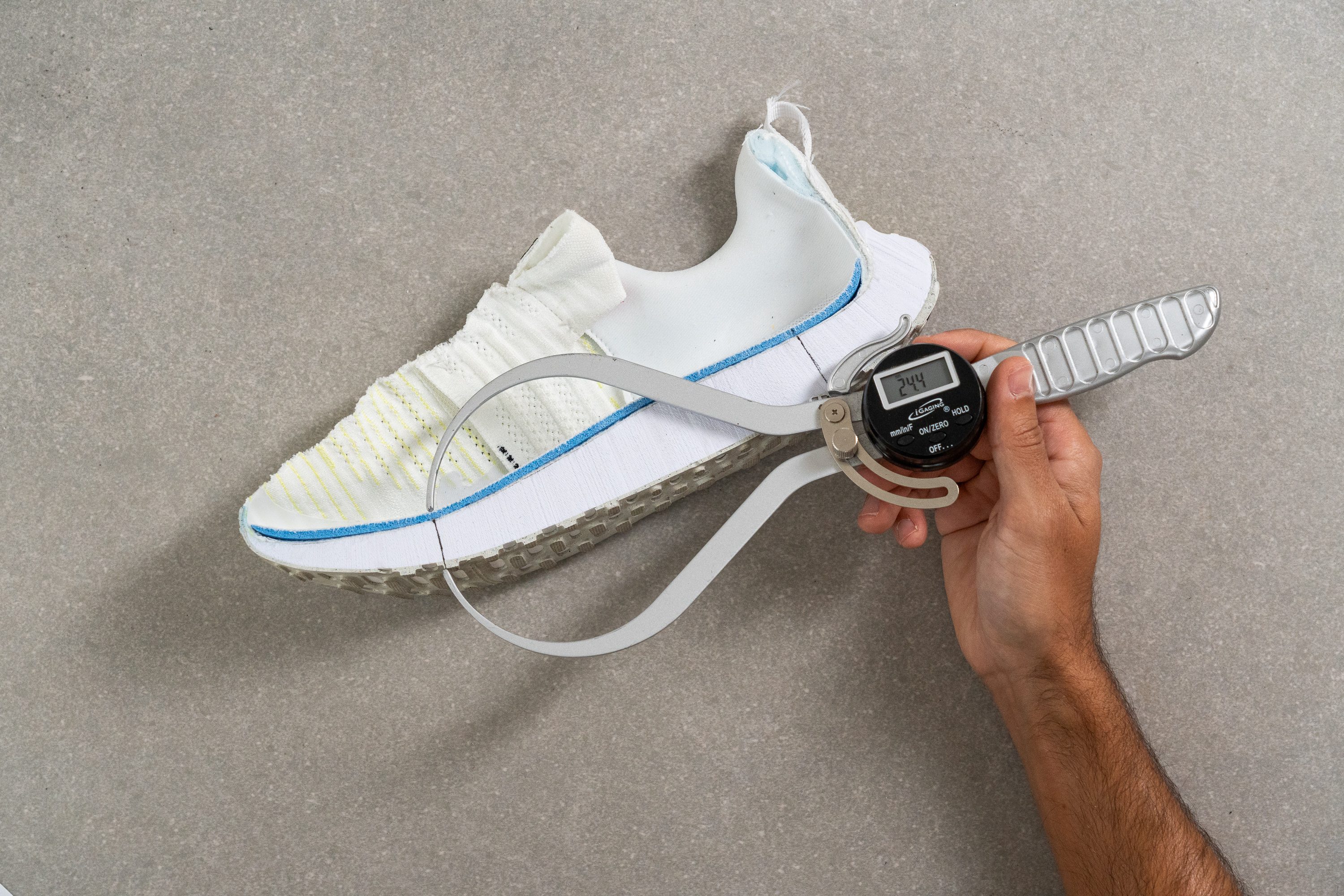
| InfinityRN 4 | 24.4 mm |
| Average | 25.3 mm |
Drop
While Nike lists this shoe with a 9 mm drop, we measured it in the lab at 9.8 mm. This slight difference is within an acceptable range.
With 9.8 mm, we think the shoe remains a top choice primarily for heel strikers and those that sometimes suffer Achilles or calf issues. That said, midfoot and forefoot strikers can also comfortably wear it, although they might benefit more from a lower-drop daily trainer like the Hoka Clifton 9.
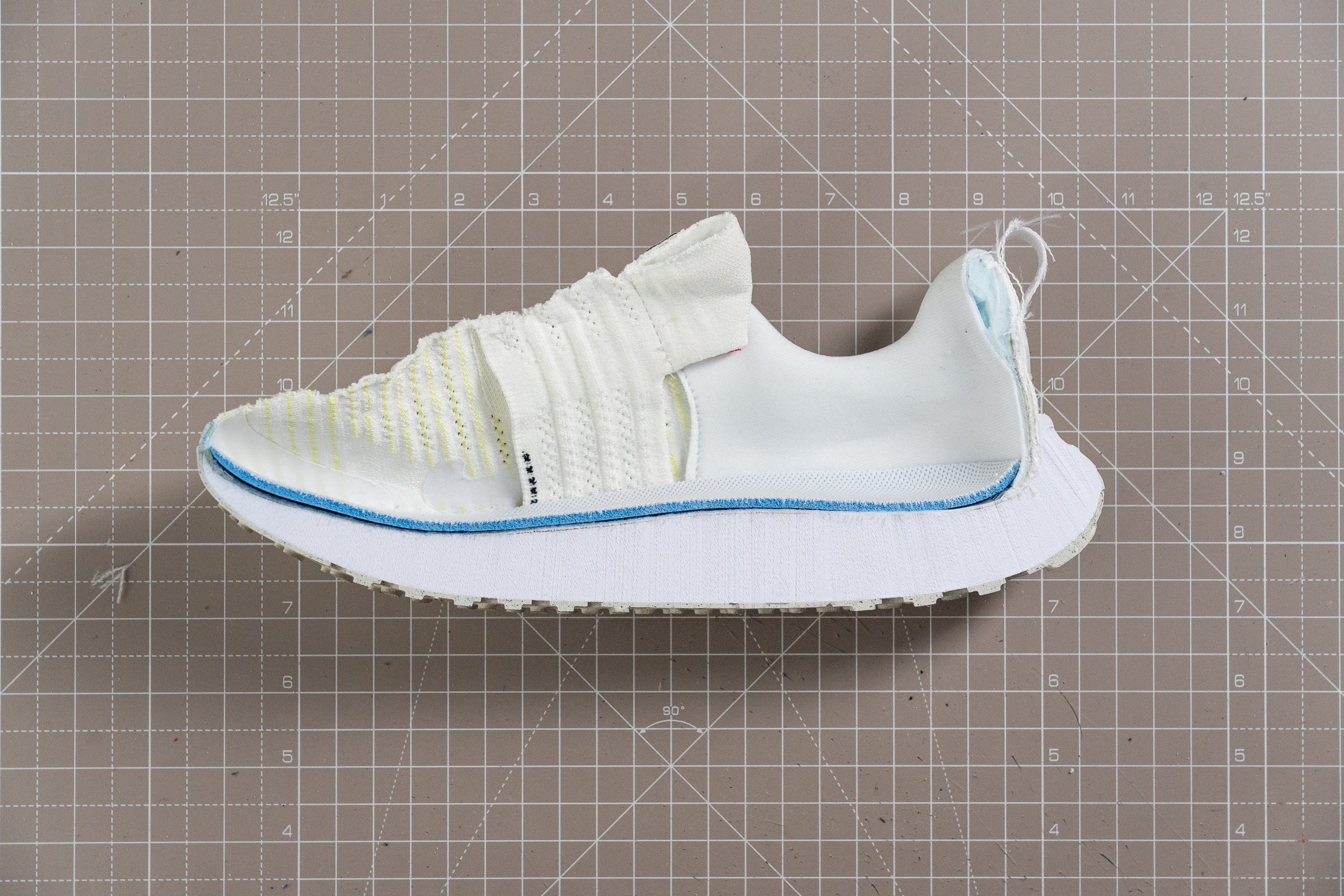
| InfinityRN 4 | 9.8 mm |
| Average | 8.6 mm |
Insole thickness
We were on the lookout for a comfort-boosting thick insole, but what we found was quite the opposite—a super-thin one. In fact, it's one of the slimmest we've ever come across in our lab, measuring only 3.1 mm!
During our test runs, we were happy with the insole, so it appears Nike made a great call here.
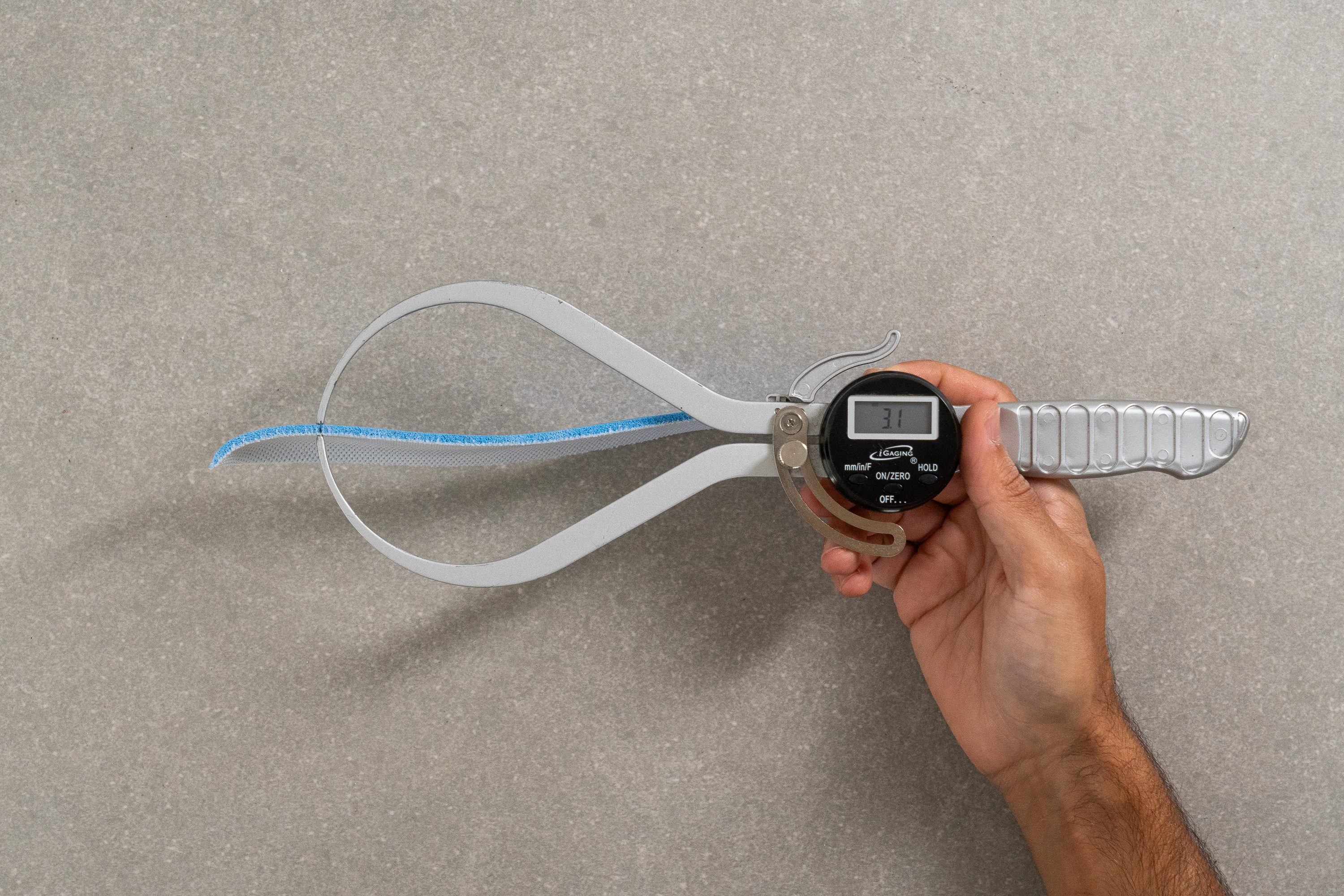
| InfinityRN 4 | 3.1 mm |
| Average | 4.4 mm |
Midsole softness
The biggest update from the Nike React Infinity Run Flyknit 3—apart from its shorter name—is the foam. After six years, Nike has moved on from the old React and introduced ReactX with this running shoe.
Observe how the foam is shaped to enhance compression toward the heel.
ReactX is a more responsive and softer variant of the original React. Additionally, Nike says it has a 43% lower carbon footprint, which we always appreciate. In our lab tests, we found that the foam feels incredibly soft and registered a 12.5 HA on our durometer—20% softer than the v3.
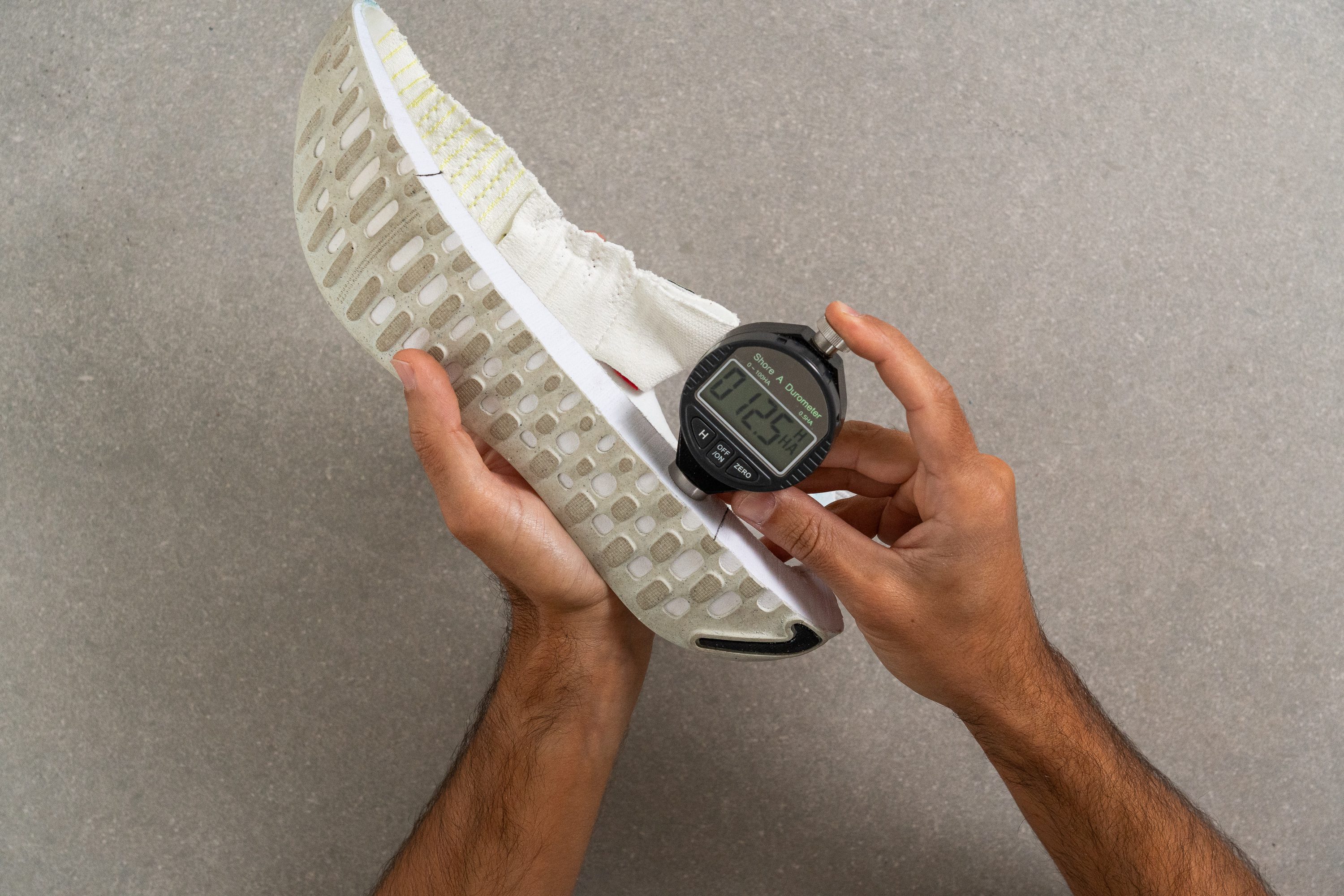
| InfinityRN 4 | 12.5 HA |
| Average | 21.0 HA |
Difference in midsole softness in cold
After placing the shoes in our freezer for 20 minutes to simulate cold weather conditions, we noticed a disappointing change—the foam got noticeably harder (19.0 HA).
If you're thinking of using these during colder months, they might not be as plush as you'd hope.
There's a staggering 52% difference between the two tests. This happens because ReactX it's still a mix of TPE and EVA. Sadly, this means the foam doesn't hold up well in cold temperatures.
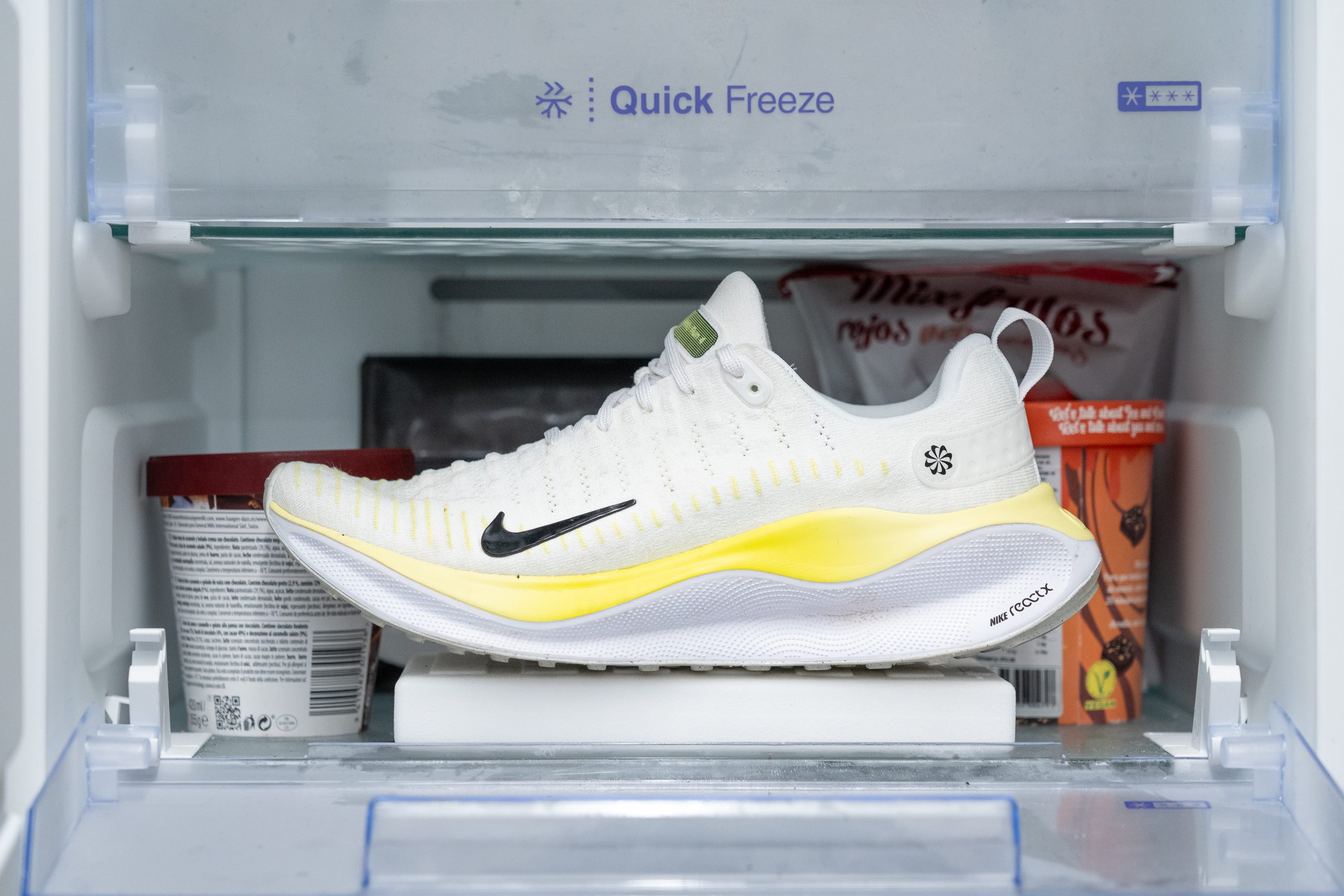
| InfinityRN 4 | 52% |
| Average | 25.2% |
Stability
Lateral stability test
This shoe is designed as a neutral daily trainer without added stability features. So, given the plush midsole, we didn't anticipate exceptional stability.
Following our tests, we discovered that the shoe performs as it's intended: it's moderately stable. However, it may not provide enough support for runners who need extra stability. For those runners, we'd recommend looking into the ASICS Kayano 30.
Torsional rigidity
We rated the InfinityRN 4 at 3/5 for torsional rigidity during our manual assessment in the lab.
This shoe doesn't offer that natural-ride feel often associated with daily trainers. If you're after a shoe that you can twist without any issue and gives a more natural feel, consider the Saucony Ride 16.
| InfinityRN 4 | 3 |
| Average | 3.3 |
Heel counter stiffness
The heel counter offers ample padding and flexibility, making it suitable for those who have Achilles issues. We gave it a rating of 2/5 in our evaluation.
| InfinityRN 4 | 2 |
| Average | 2.8 |
Midsole width in the forefoot
The decent stability of this shoe, despite its height and cushioned foam, can be attributed to its broad forefoot.
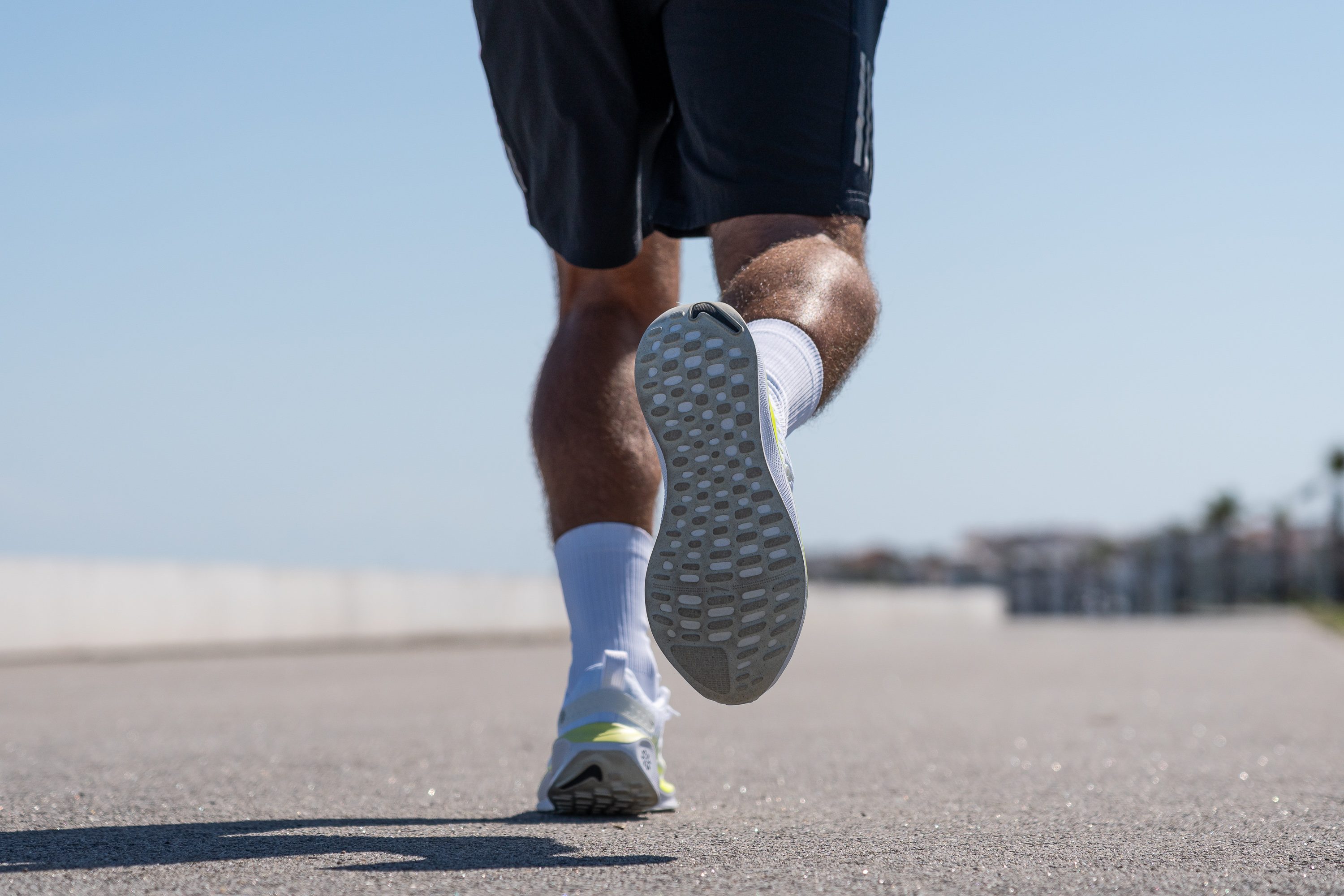
Measuring at 118.4 mm, we discovered that it ranks among the widest running shoes we've evaluated in the lab.
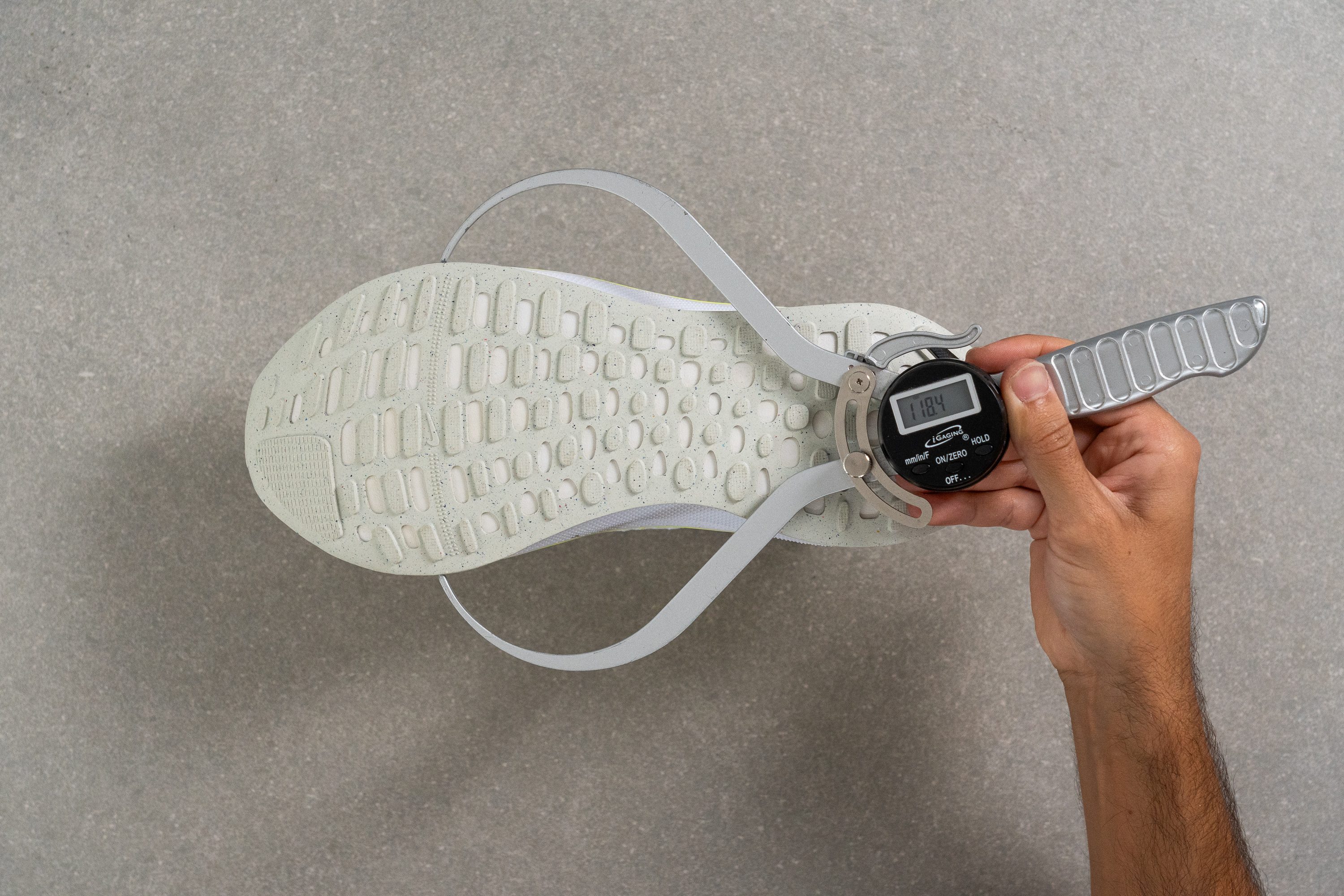
| InfinityRN 4 | 118.4 mm |
| Average | 113.9 mm |
Midsole width in the heel
While the forefoot showcases a wide design, the heel—true to Nike's signature style—doesn't follow suit and is just average. We've accurately measured it at 91.2 mm.
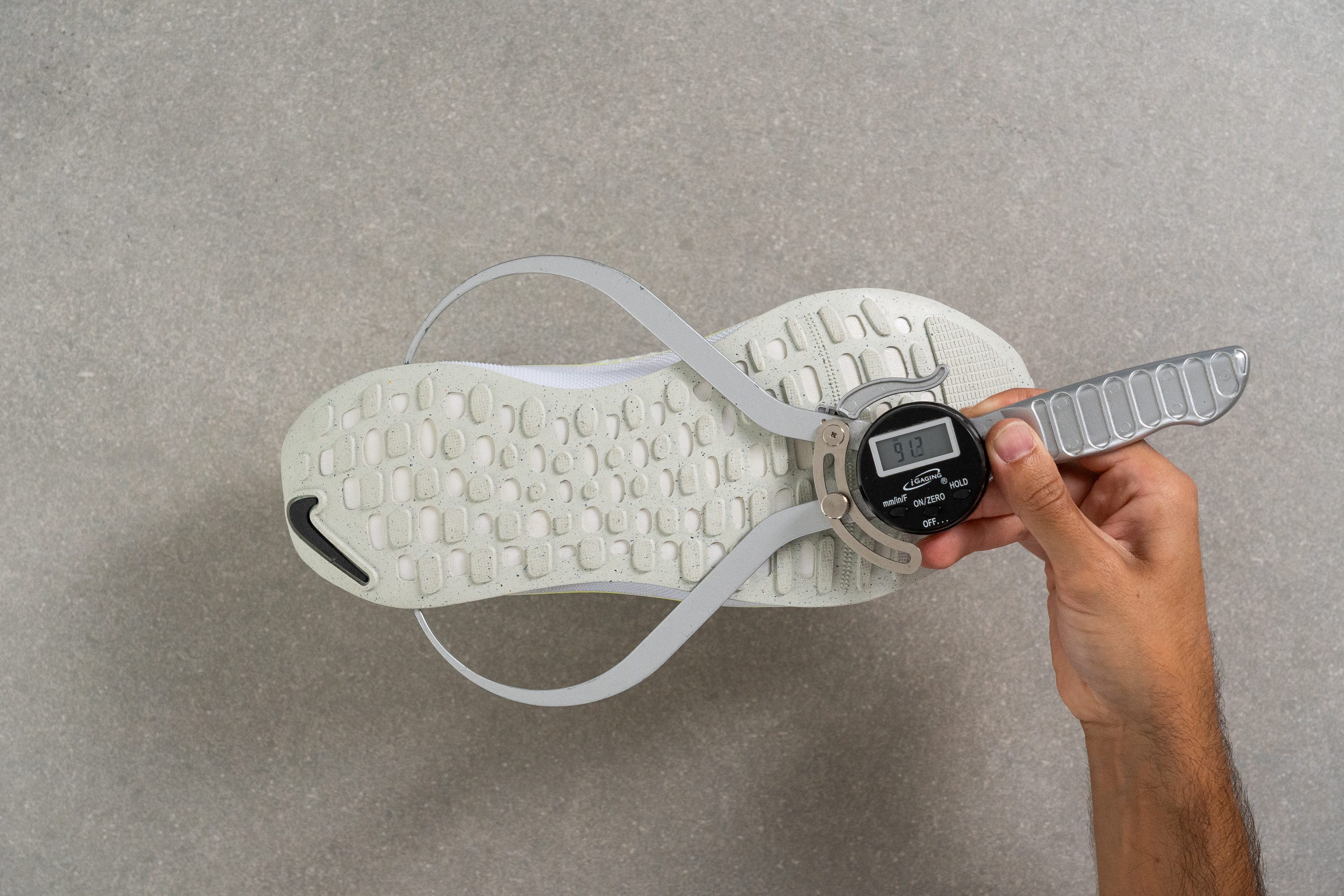
| InfinityRN 4 | 91.2 mm |
| Average | 90.5 mm |
Flexibility
Stiffness
At the beginning of our lab review, we discussed the dual purpose of the outsole cutouts: to reduce weight and enhance flexibility. Now, we're diving into the flexibility measurements. During our evaluations, it took just 15.8N of force to flex the shoe to a 90-degree position.
This indicates that the InfinityRN 4 offers a flexible experience and doubles well as a walking shoe. However, it's essential to understand that this speaks to its longitudinal flexibility, not the torsional aspect.
| InfinityRN 4 | 15.8N |
| Average | 28.8N |
Difference in stiffness in cold
Just like our midsole softness evaluation, we tried the same test after leaving the shoe in the freezer for 20 minutes.
The outcome was disappointing. The shoe became much stiffer, and we had to exert 27.2N of force to bend it to the same point.
With a 71.6% increase, we're certain you'd feel the difference if you're in a cold-weather region.
| InfinityRN 4 | 71.6% |
| Average | 34.9% |
Size and fit
Internal length
Upon our initial try-on of the shoe, it felt really short to us. We immediately took precise measurements and found it to be 259.9 mm.
This is a noticeable 10.1 mm shorter than the 270 mm that Nike claims on their size charts. Most runners will likely need to go up at least half a size when considering the Infinity RN 4.
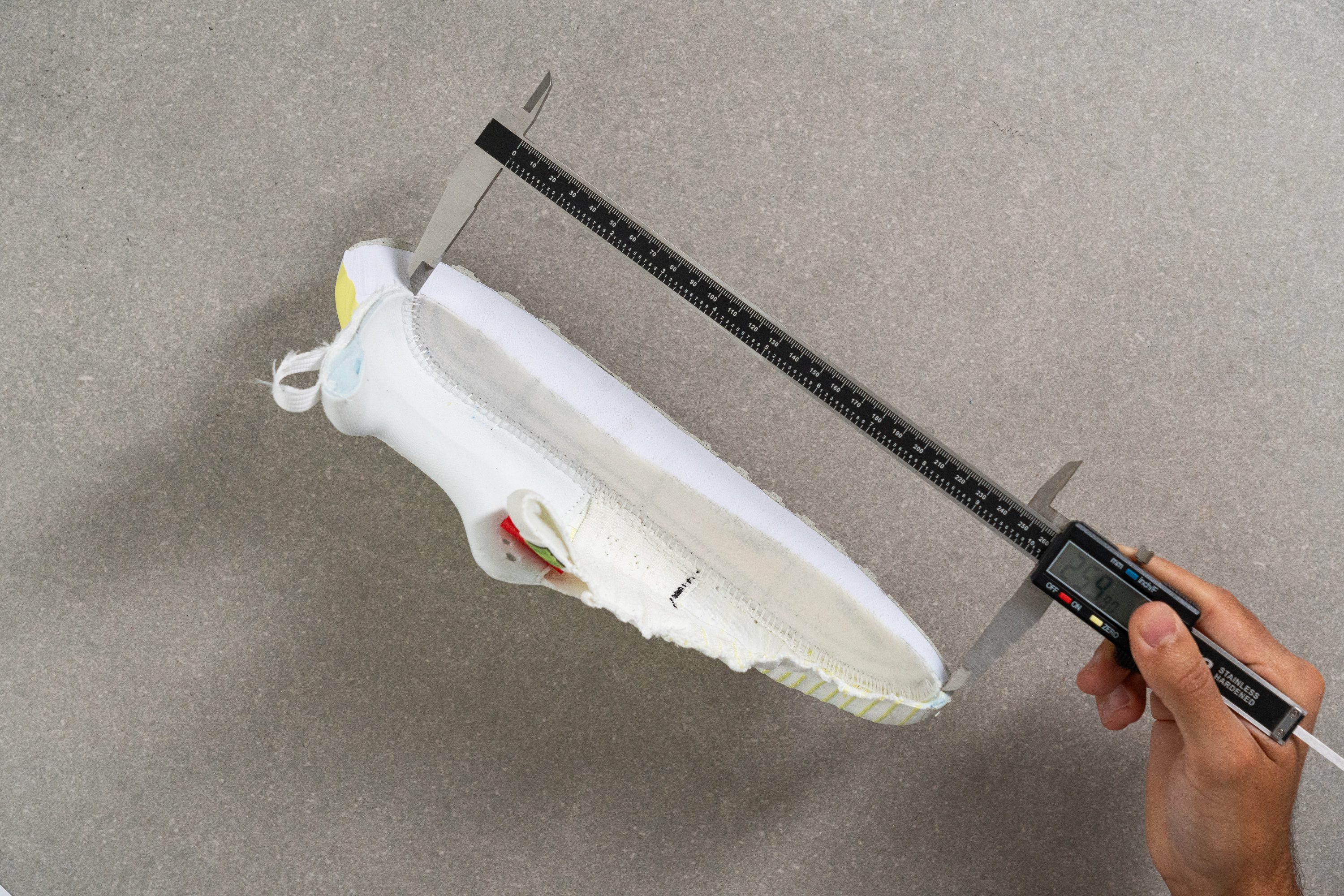
| InfinityRN 4 | 259.9 mm |
| Average | 269.2 mm |
Toebox width at the widest part
As a daily trainer designed towards comfort, we anticipated a generously spacious toebox—and we were delightfully satisfied.
Measuring at an impressive 99.9 mm at its widest point, it provides ample space and comfortably accommodates those with wide feet.
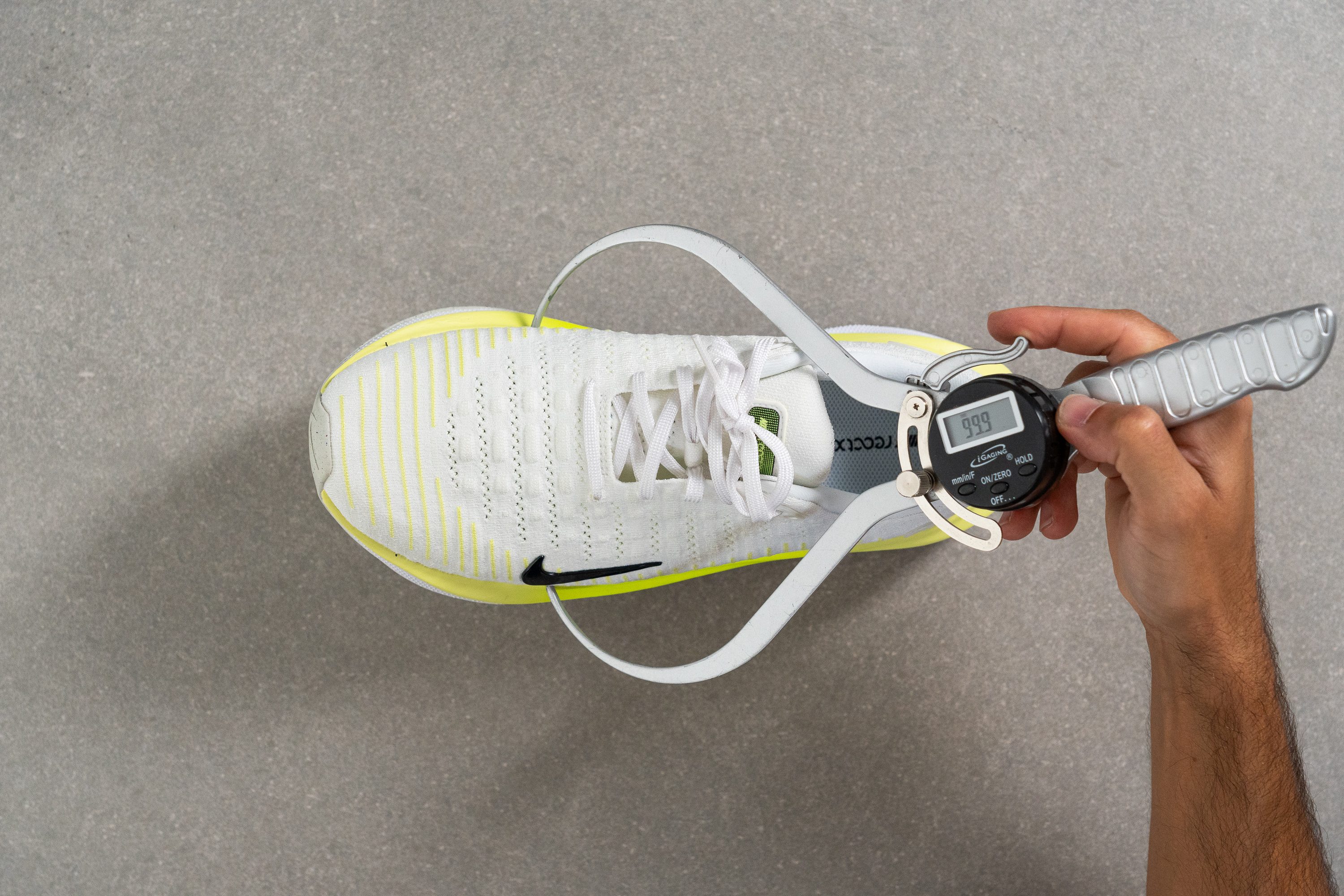
| InfinityRN 4 | 99.9 mm |
| Average | 98.4 mm |
Toebox width at the big toe
The excellence continues in the big toe area, where we found an impressive width of 80.0 mm.
This feature is a wonderful find for individuals with Roman or German foot shapes, as their pinky toe often struggles for space in narrower shoes.
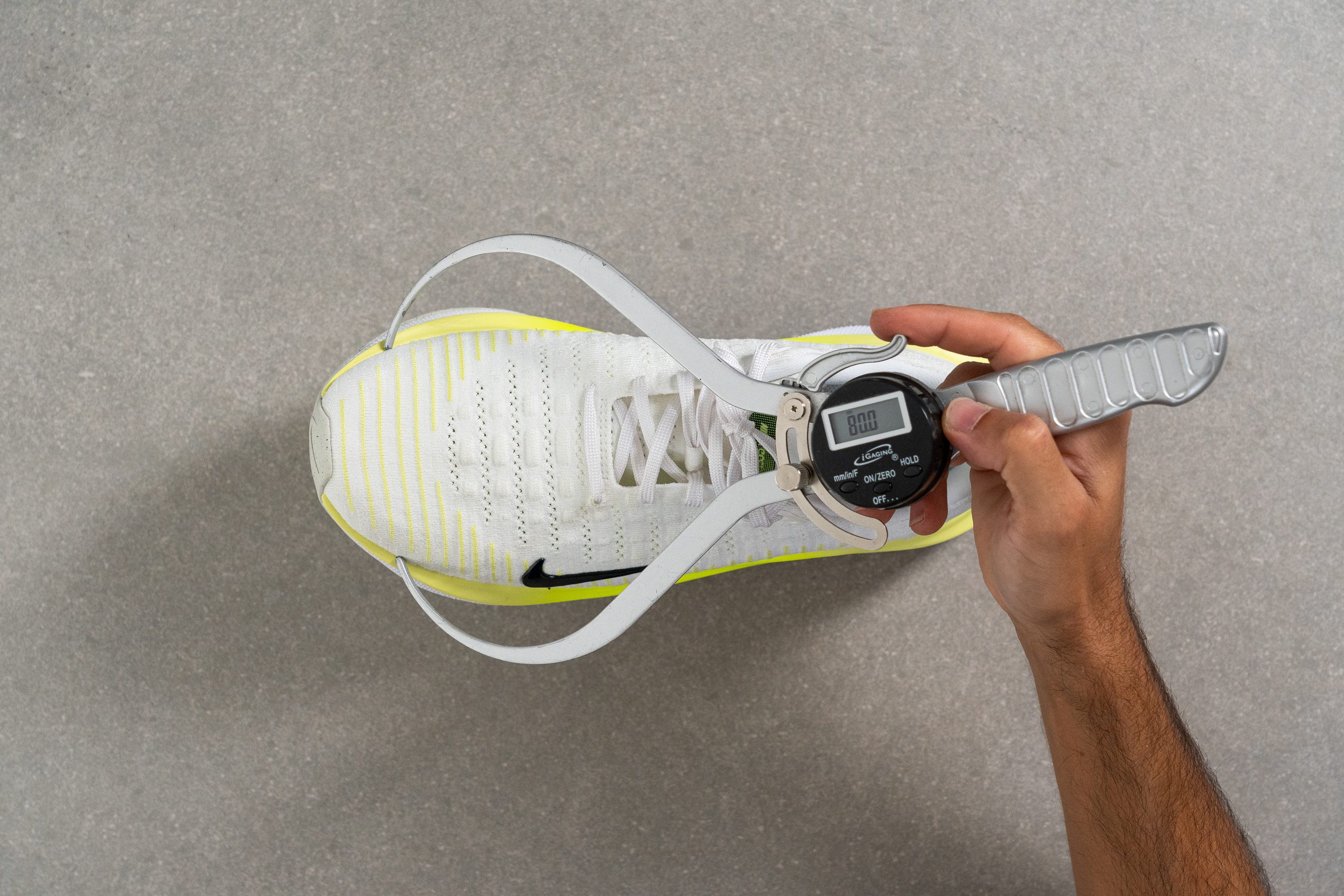
| InfinityRN 4 | 80.0 mm |
| Average | 78.3 mm |
Tongue: gusset type
With its $160 price tag, we were curious to see if Nike had decided to improve their margins by using a non-gusseted tongue in the shoe. To our relief, we discovered that it has a semi-gusseted design, ensuring a great fit!
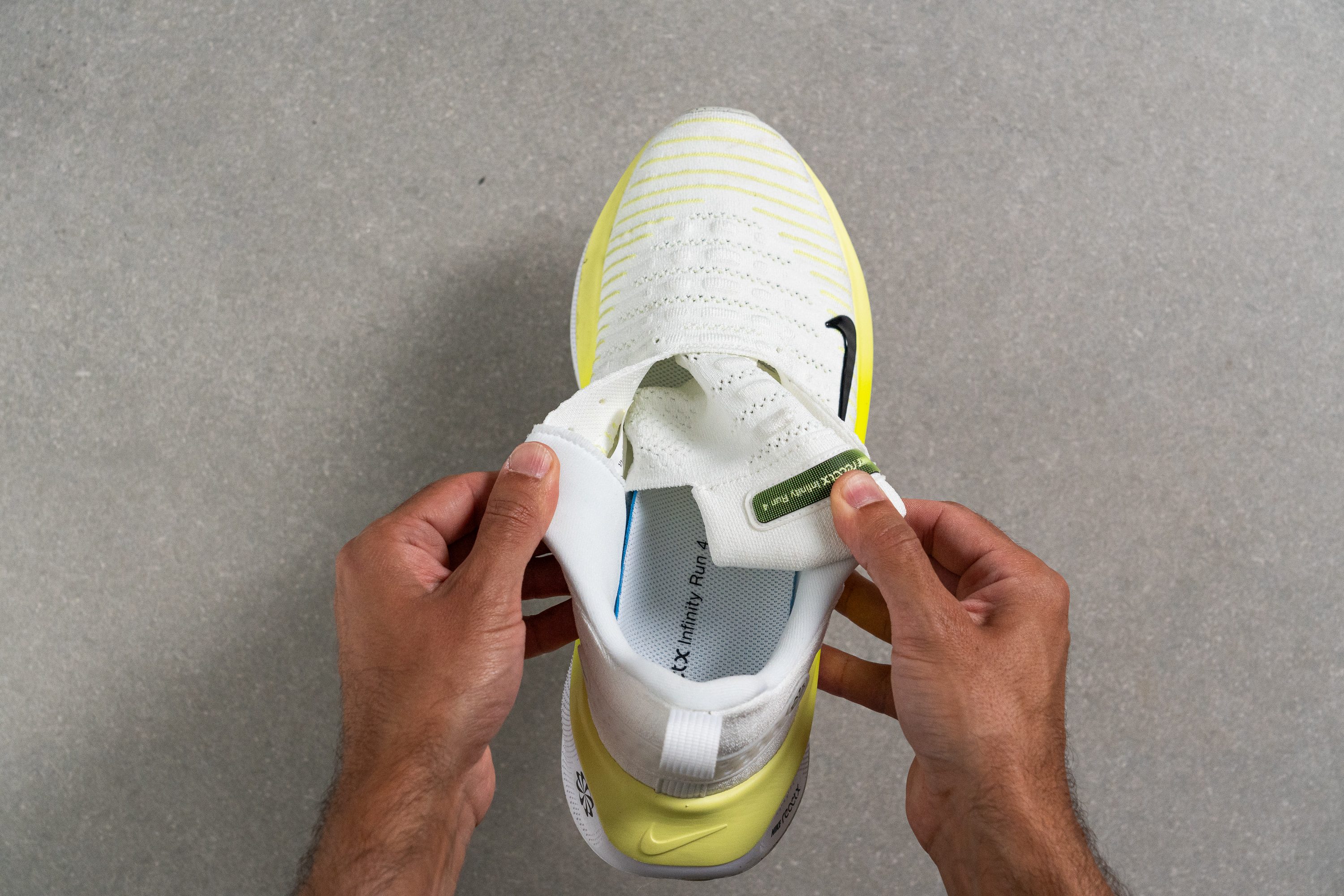
| InfinityRN 4 | Both sides (semi) |
Comfort
Tongue padding
We measured the tongue's padding at 5.6 mm, finding it to be optimally cushioned. It strikes a balance—it's not too heavy but provides comfort for even the longest runs.
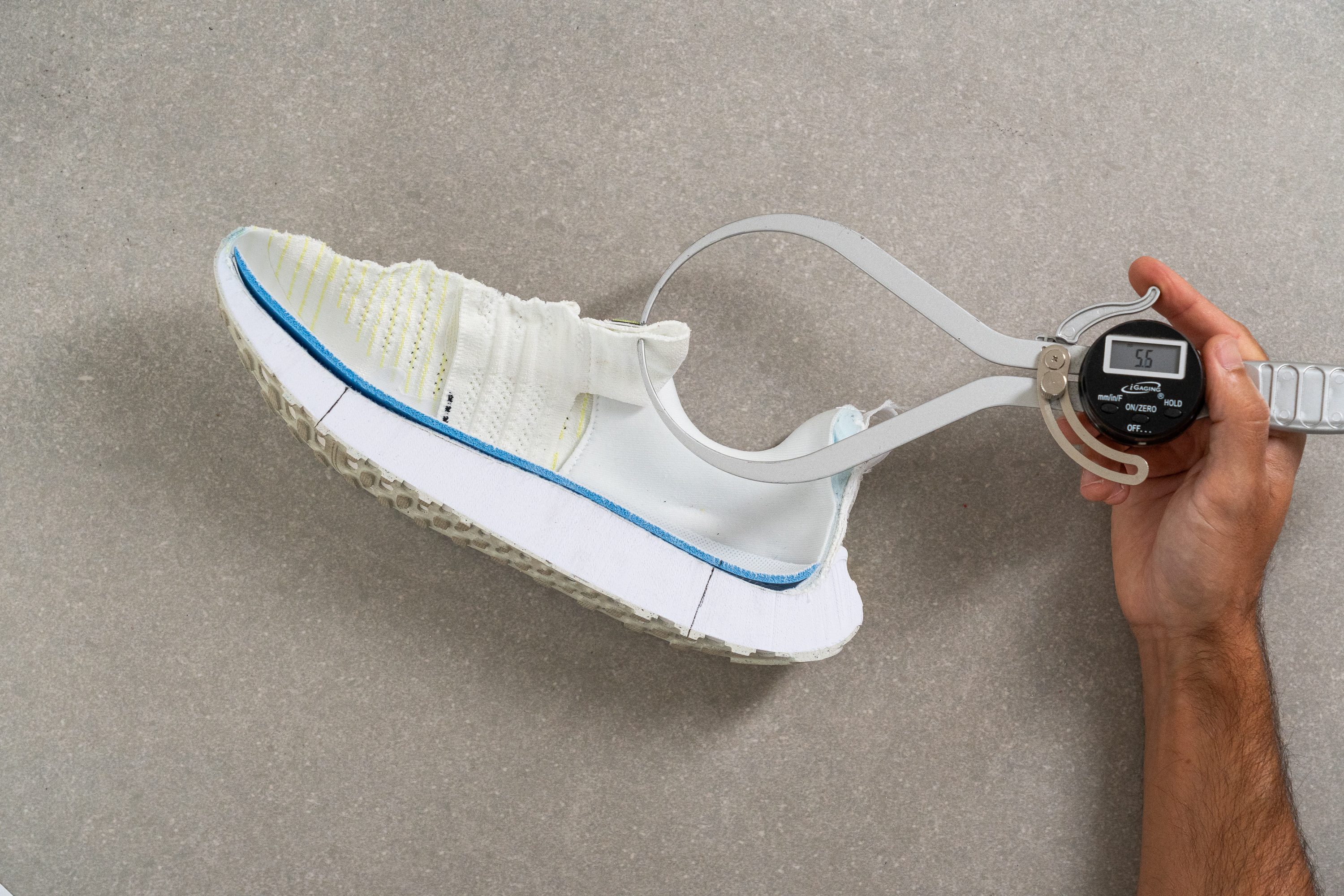
| InfinityRN 4 | 5.6 mm |
| Average | 5.7 mm |
Heel tab
Thankfully, Nike included a finger-loop heel tab! It's convenient and looks amazing.
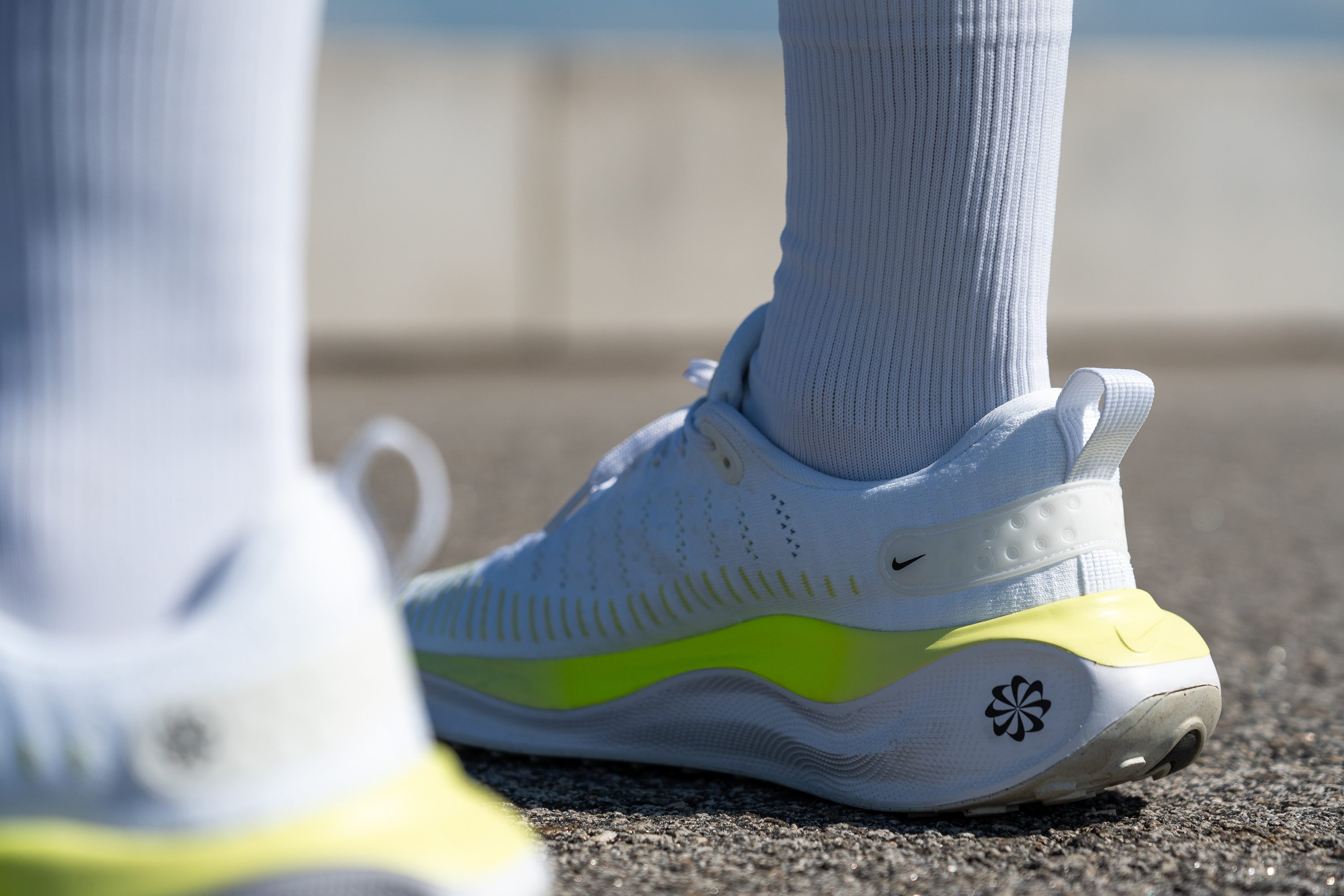
| InfinityRN 4 | Finger loop |
Removable insole
The insole can be taken out without any problem, and we were able to use different orthotics and insoles from other models.
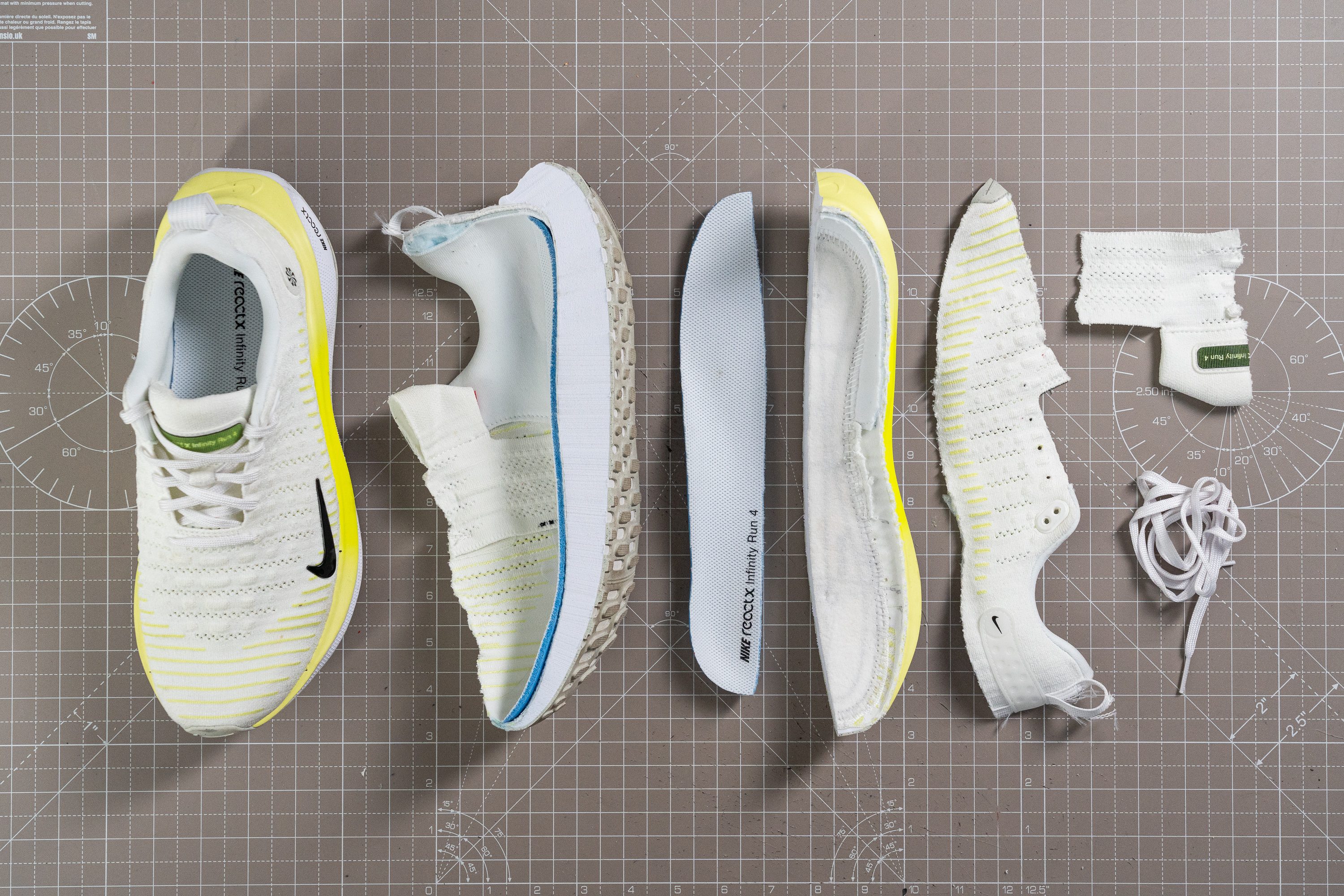
| InfinityRN 4 | Yes |
Misc
Reflective elements
It seems Nike doesn't intend for us to run in these during the nighttime, as there are no reflective elements at all.
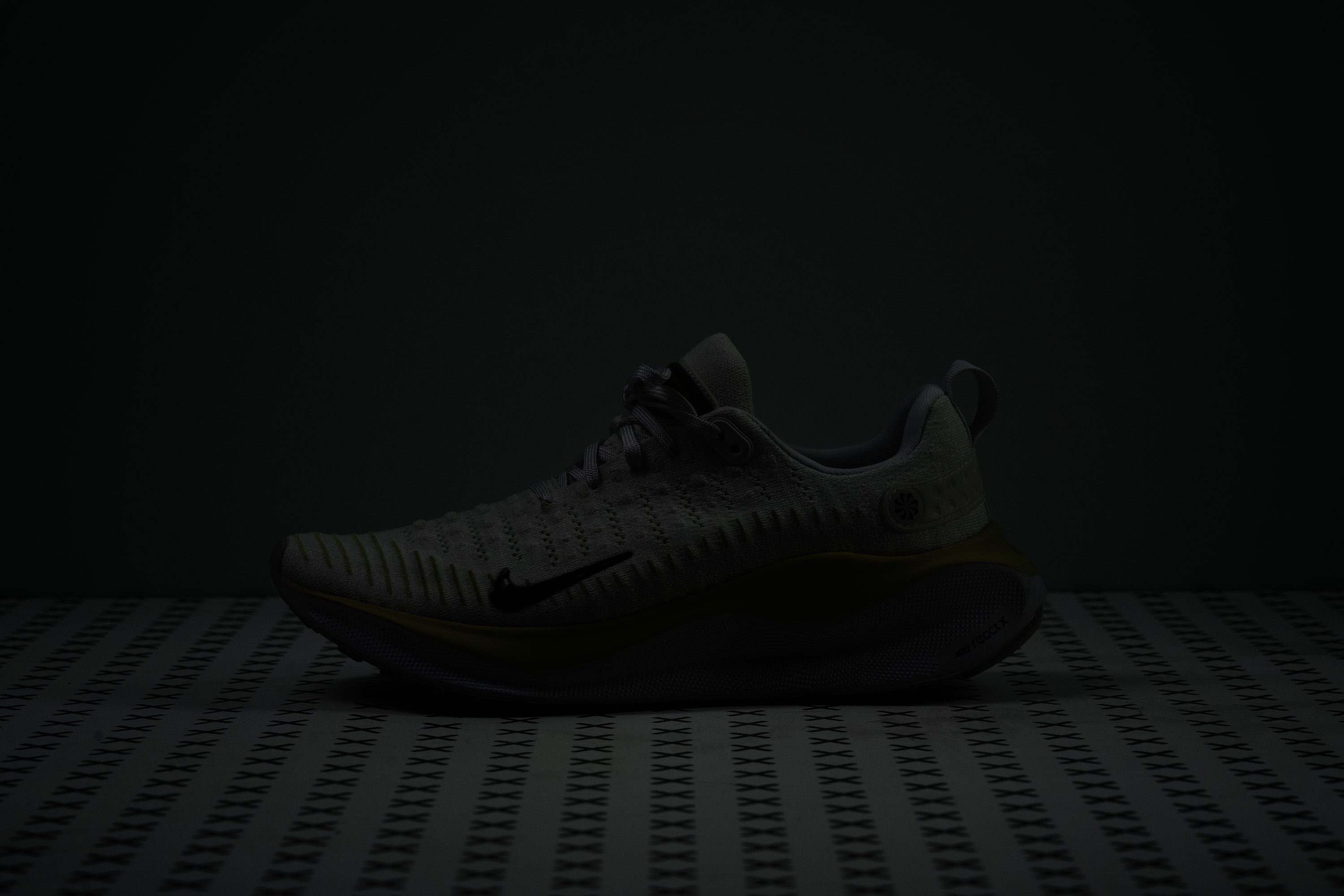
| InfinityRN 4 | No |

